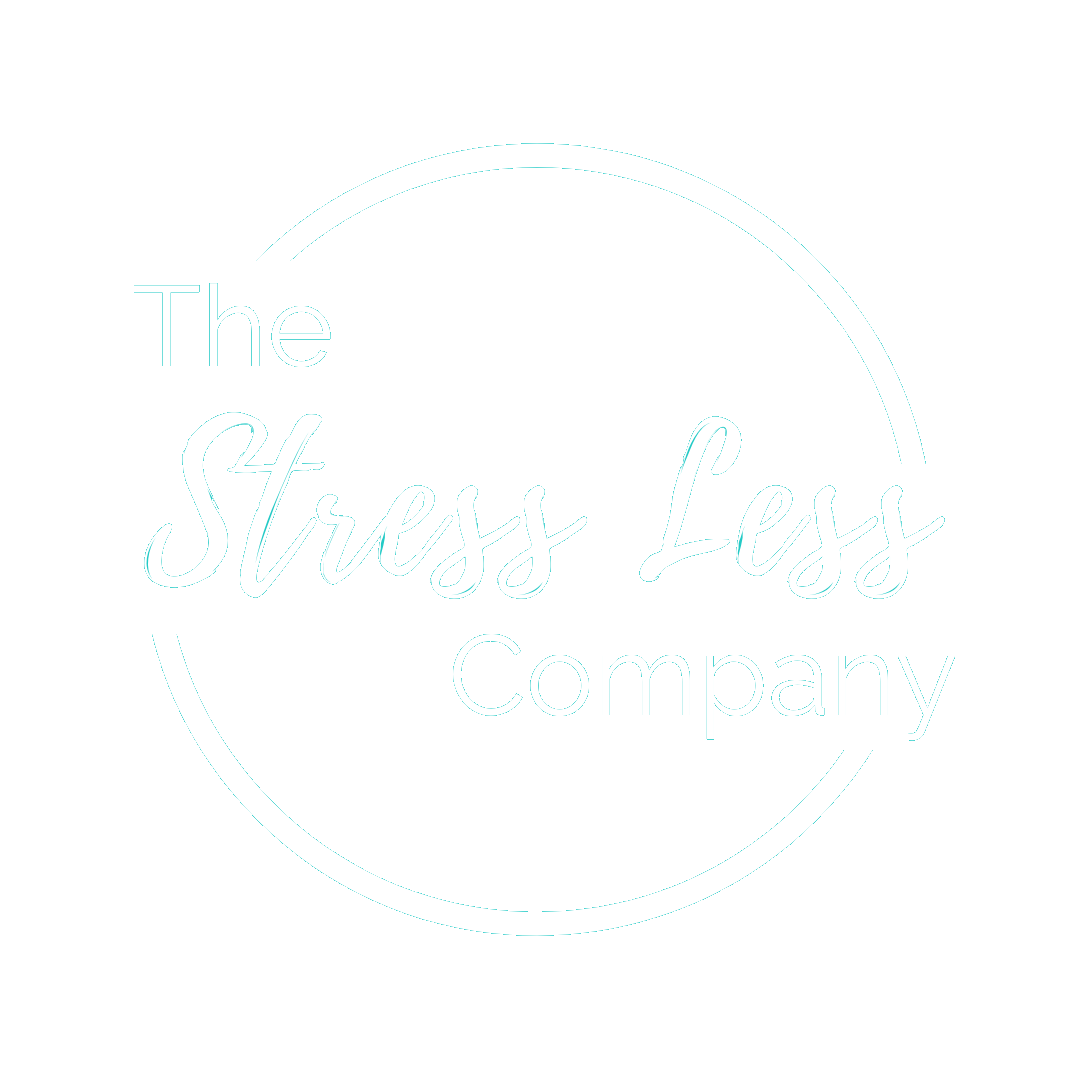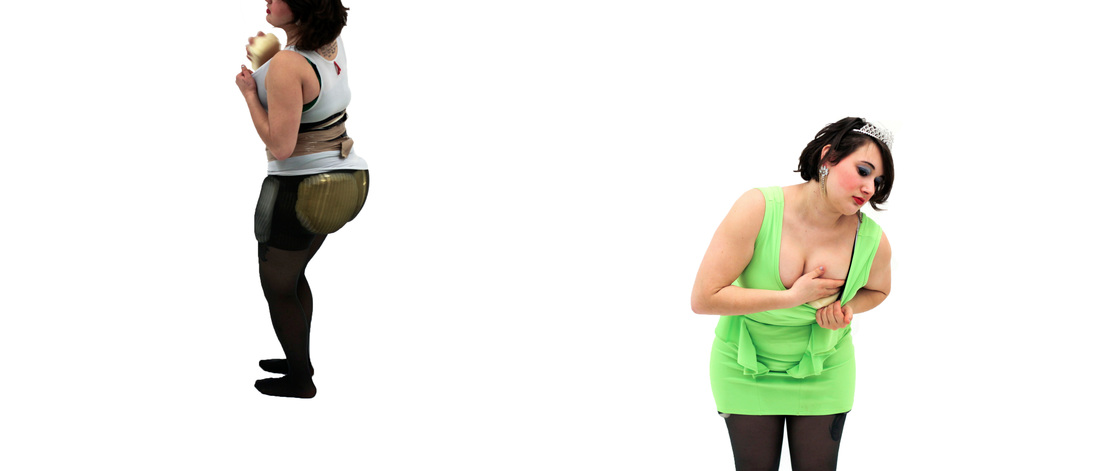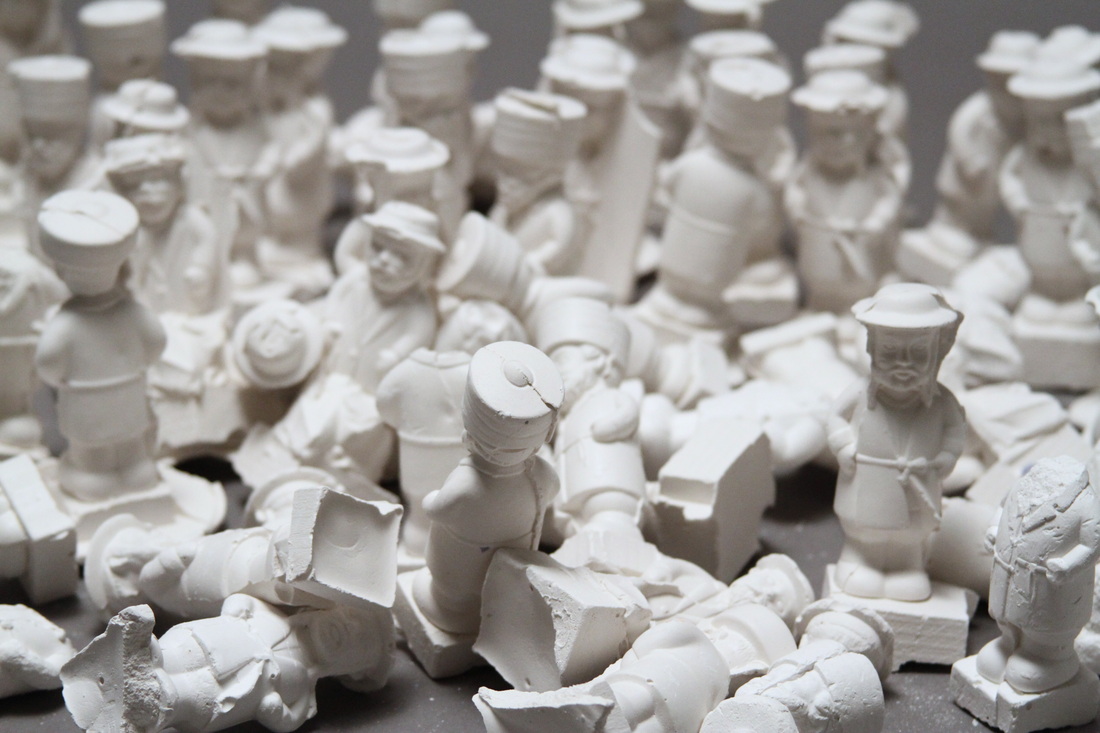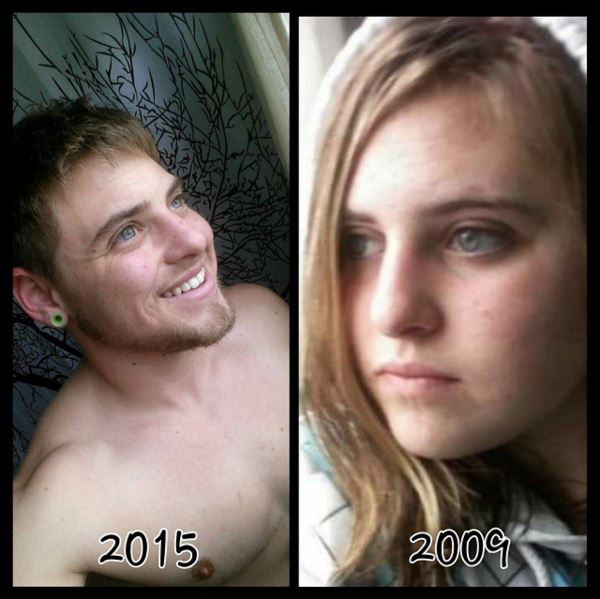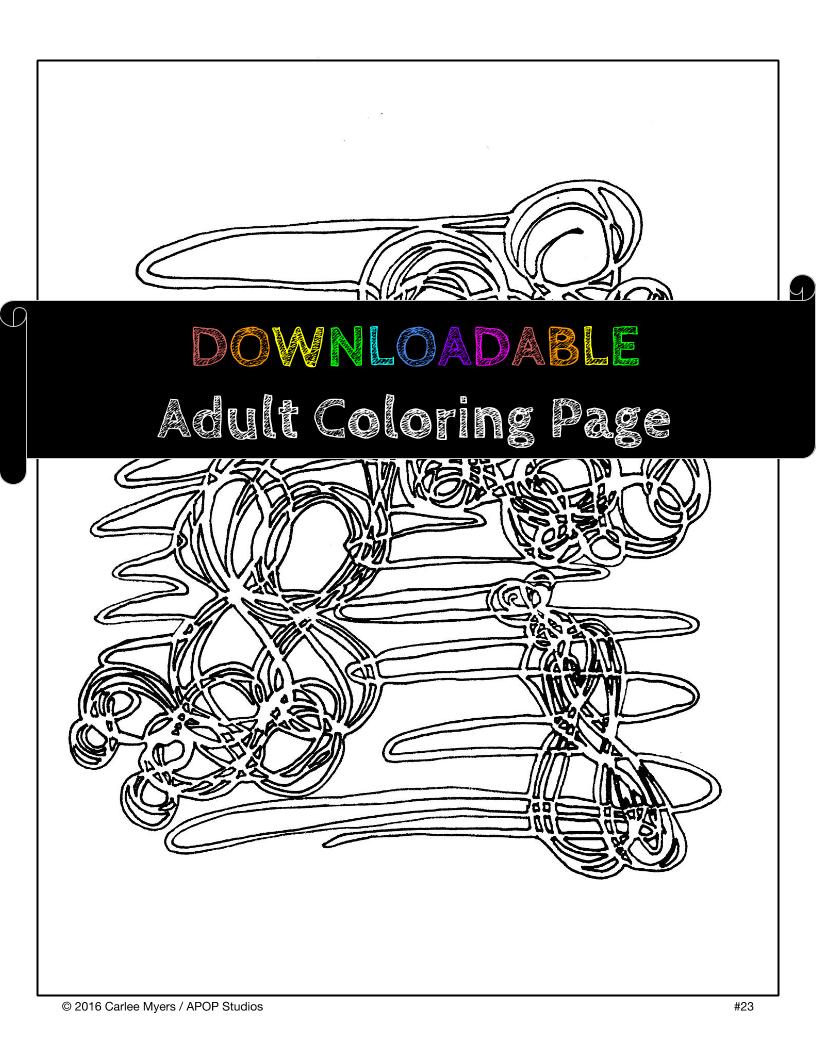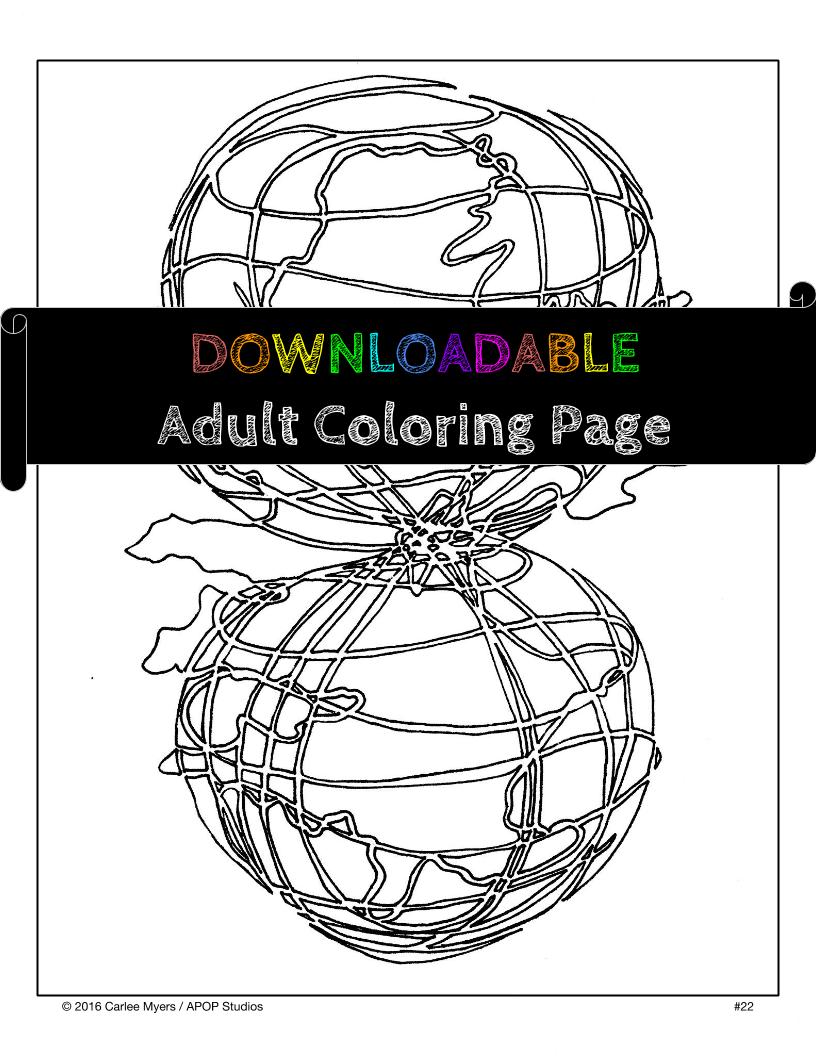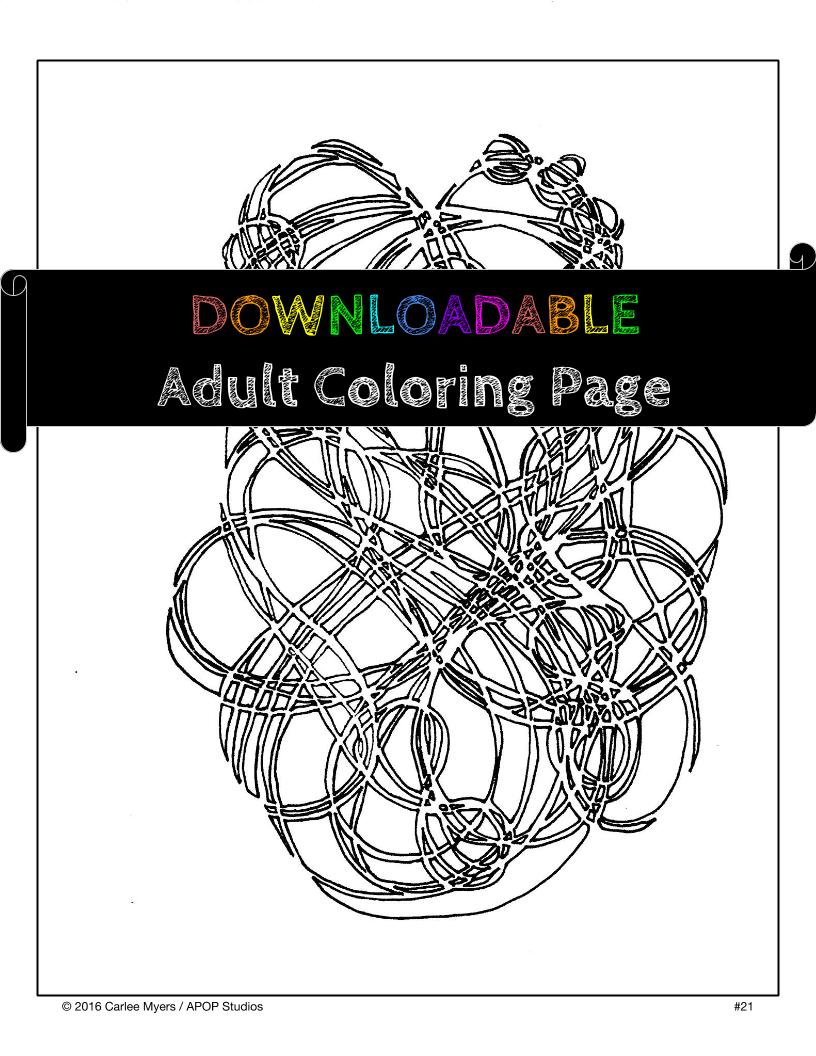https://www.youtube.com/watch?v=rTLI1ttTPC0
How to Price Your Artwork/ Using Your Time Wisely
https://www.youtube.com/watch?v=Y6vyWuWK42Q
Happy Hustler of the Month: Nathan Hale
About:
"My Name is Nathan Hale of Albany, Ohio, a small village located in Southeast Ohio. The youngest of four boys and I was born with Bilateral Congenital Vertical Talus also known as Rocker Bottom Feet. In short my Achilles Tendons were about 1.5inches to short and my arches are upside down so I walk on a bone mass located in the middle of my feet where the arch normally is located. This would become a big problem for me by the age of twelve as I was active in three sports and developed a love for football. Starting at age twelve the pain had gotten so bad I finally met a sports medicine doctor who was willing to try and help. From age 12-17 I had 2 complete reconstructive feet operations and 2 more screw removal operations. At age 18 I had one more major foot operation in hopes that if it worked I could have the same operation on my other foot then I could go back and play college football. A few months before that operation I was instructed by my surgeon to quit college football after bones shifted in my left foot crushing my Plantar nerve and artery. I tried this last big operation in hopes that it would allow me to go back to play college football, it was unsuccessful.
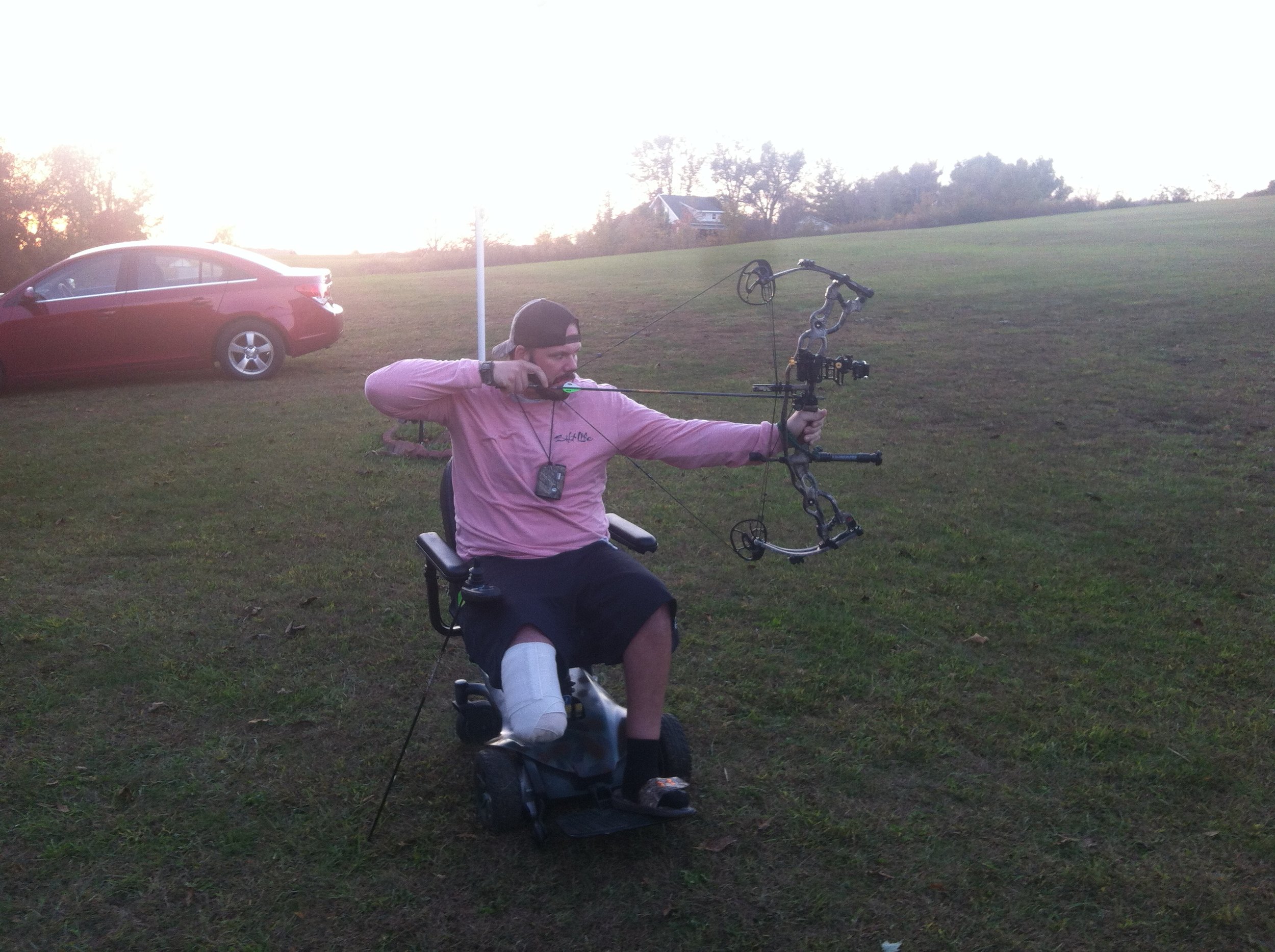 This was the start of some bad years in my life. I moved home and I started drinking heavily and using drugs. The pain of losing a game I loved and working so hard to make it to the next level crushed me. I was able to hide my troubles from the world and worked building houses while I attended Ohio University where I would eventually earn a degree in Specialized Studies in Psychology and Child and Family Life Studies. Then at the age of 28 I was told by my surgeon that double below the knee amputation would be my best option. I understood it could be an option due to the kind of pain I felt daily. From the time I woke up till I went to bed my feet hurt and if I did any activity it made my knees hurt worse than my feet and on some days my hips would start hurting bad too. Over the next 4-5 years I visited many Podiatrist and Orthopedic doctors. Most agreed with amputation, some didn’t and some had never even seen a case of what I had in real life. One thing they all agreed on is that I would experience a lot of pain my whole life living on these feet especially if I wanted to remain active. So at the end of all that it came down to this a choice, my choice to in my early 30’s amputate or start living a life of pain and take serious pain medicine daily to try and have some “normalcy” to life. At that moment I also knew I could not make this choice living the hidden life of addiction and feel 100% confident in it. I was able to stop using and became a man of faith, changed the way I thought and the kinds of thoughts I would allow myself to have and nothing has been the same since and life has been amazing. After a year of prayer, weighing my options and even seeing a therapist a few months I made the choice to have my right foot amputated on September 15, 2016. That fall I spent a lot of time in the woods during archery season healing both physically and mentally as I adjusted to learning how to live as an amputee. All that time setting in such a beautiful place watching life at its most basic gave me time to think on where I would like to take my life from here and the impact I would like to make with my story.
This was the start of some bad years in my life. I moved home and I started drinking heavily and using drugs. The pain of losing a game I loved and working so hard to make it to the next level crushed me. I was able to hide my troubles from the world and worked building houses while I attended Ohio University where I would eventually earn a degree in Specialized Studies in Psychology and Child and Family Life Studies. Then at the age of 28 I was told by my surgeon that double below the knee amputation would be my best option. I understood it could be an option due to the kind of pain I felt daily. From the time I woke up till I went to bed my feet hurt and if I did any activity it made my knees hurt worse than my feet and on some days my hips would start hurting bad too. Over the next 4-5 years I visited many Podiatrist and Orthopedic doctors. Most agreed with amputation, some didn’t and some had never even seen a case of what I had in real life. One thing they all agreed on is that I would experience a lot of pain my whole life living on these feet especially if I wanted to remain active. So at the end of all that it came down to this a choice, my choice to in my early 30’s amputate or start living a life of pain and take serious pain medicine daily to try and have some “normalcy” to life. At that moment I also knew I could not make this choice living the hidden life of addiction and feel 100% confident in it. I was able to stop using and became a man of faith, changed the way I thought and the kinds of thoughts I would allow myself to have and nothing has been the same since and life has been amazing. After a year of prayer, weighing my options and even seeing a therapist a few months I made the choice to have my right foot amputated on September 15, 2016. That fall I spent a lot of time in the woods during archery season healing both physically and mentally as I adjusted to learning how to live as an amputee. All that time setting in such a beautiful place watching life at its most basic gave me time to think on where I would like to take my life from here and the impact I would like to make with my story.
As I continue to heal physically and am now back on my feet I am currently working on starting a career in public speaking. I want to focus on high school and college athletes and share my story of losing college football, the fight with addiction that followed and how I was able to fight back from that to become a happy, healthy amputee (and possible double amputee) who loves life as much now as I ever have and am excited for a future of making others the best they can be by sharing my life, the mistakes I have made and the life of hope and happiness I have created for myself."
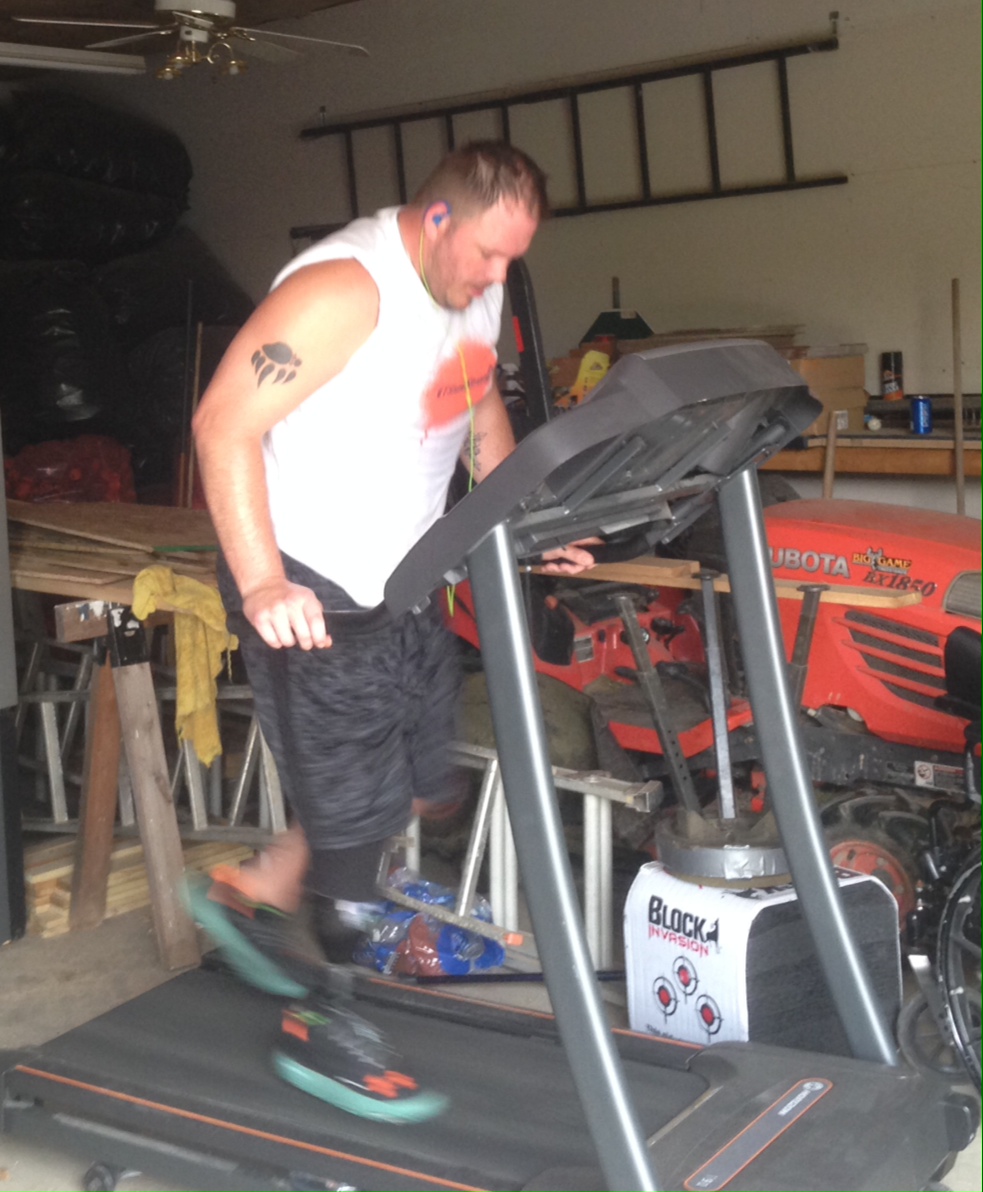 Tell us a little bit about your hustle and your happiness journey.
Tell us a little bit about your hustle and your happiness journey.
I would describe my hustle as “humble and serve.” With all I have been through physically from operations at a young age, the loss of a personal dream (college football) and overcoming addiction and a negative thought process it has made me very humble from a young age. To hurt so bad after an athletic competition at such a young age made me grateful to even be able to compete. Getting up early to get to the woods to watch the sun come up and then take a walk through the woods knowing I would hurt worse for a couple days makes you enjoy that sunrise and the world waking up just a bit more. Watching my physical ability decline like it did in my mid 20’s brought about a feeling of humility I would have probably never of had if not born with Bilateral Congenital Vertical Talus. This condition has also given me a chance to serve others. By simply sharing what I have been through and living my life as a victor people have an example they can relate to and realize there is nothing stopping them from doing things they thought they could not do. If an amputee with his other foot being bad can get up, keep a happy mindset and love others while living the most active life he can there really is no reason those who are healthy cannot do the same or better. With hard work and persistence I hope that I am able to serve others further by speaking publicly and sharing my entire story to make sure others don’t have to go down the road I did at times in my life and give them hope for a better life for themselves.
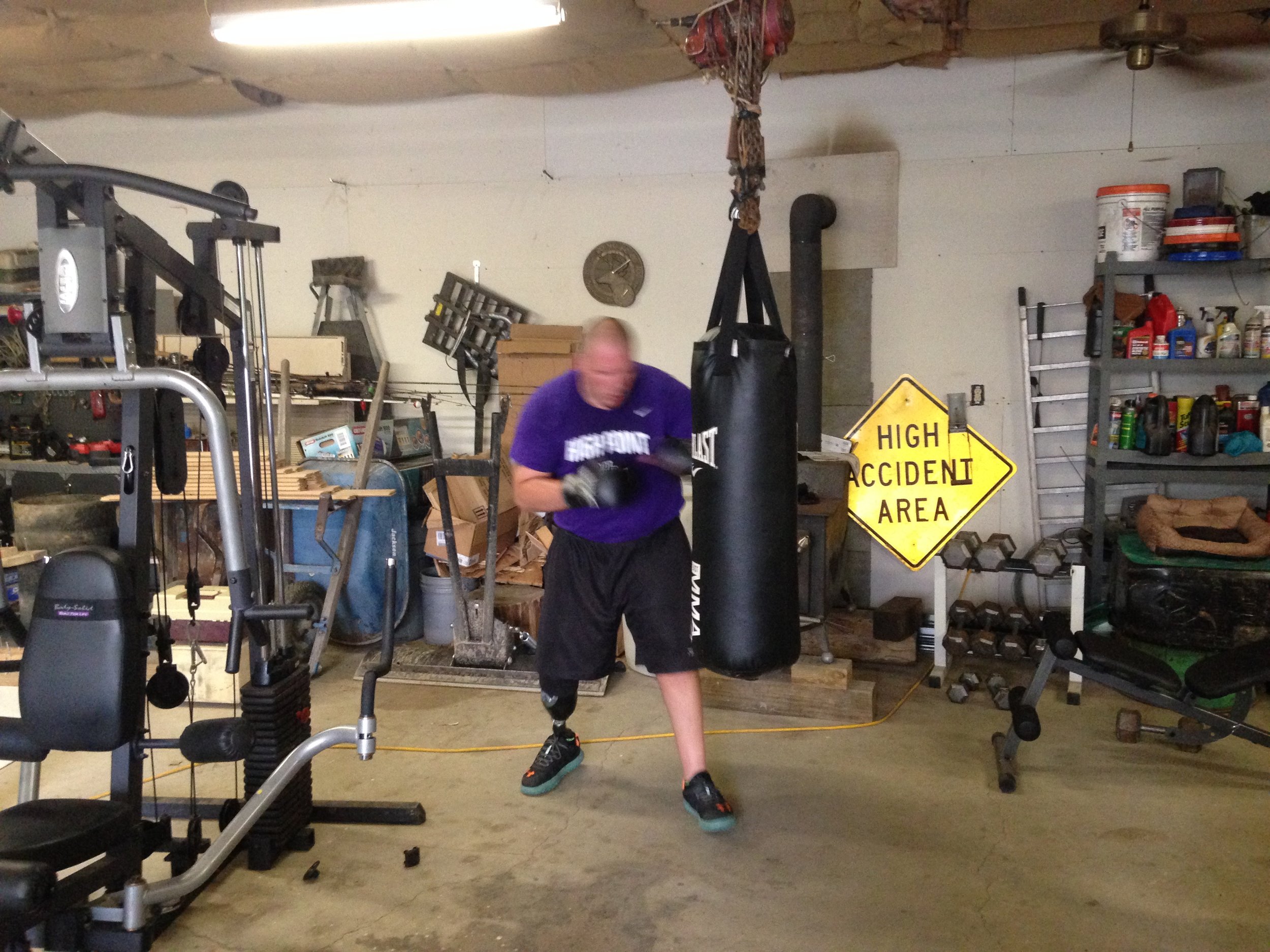
What do you do to de-stress after or during a long, stressful day?
I know in my own life that high levels of stress lead to nothing positive. There are a few things I do to de-stress when life sometimes gets to be getting the better of me. As a man of faith I pray, it’s something I can do and always have a little peace about what I prayed over. I am not saying that it fixes everything but to have a little peace to where we can think more clearly and make better decisions is a big help. I realize that faith is not everyone’s thing so I would say meditation or finding just 10 minutes of quiet time where you can simply slow your breathing, focus on the things that are good and get your thoughts going in a more positive direction. I also like to spend time outdoors when things are stressful. In the woods and in nature brings such calmness over me. Seeing the wildlife in its environment and how natural it all is brings peace and my mind is quiet and just lets goes of the stressors it was thinking about. The final thing I do for stress relief is exercise. The gym gives me a place to tap into doing something physical and positive for my body. By losing some of the physical ability I once had it feels good mentally to go to the gym and work my body to the best of my ability. I feel like I am accomplishing something that I used to take for granted and always feel better when I leave the gym then I did before I went.
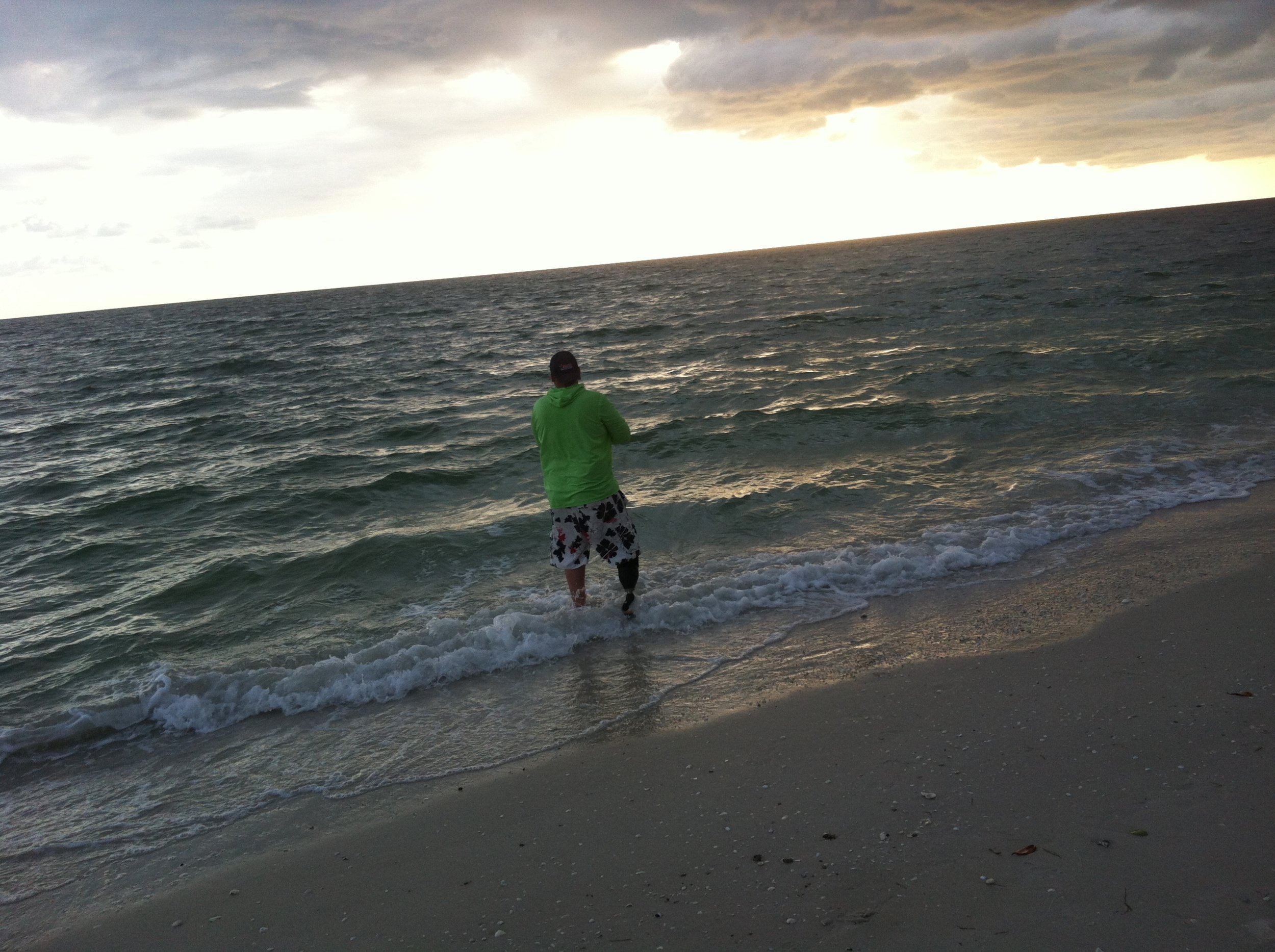 Where do you go for inspiration?
Where do you go for inspiration?
I often am inspired by other people. In this day of social media and YouTube a person can find someone doing something to inspire or be their best daily. I will get on YouTube and watch a speech from Inky Johnson or Eric Thomas, watch one of those guys and tell me you do not want to be a better you. I also follow people on Instagram and other social media outlets that I look up to or people who are using their lives to make others better, the Rock, Cameron Hanes and Inky Johnson as well as people I have met or people in and around my community. Inspiration is everywhere if we choose to look for it.
What are you currently reading or listening to (podcasts, books, blogs, etc.)?
I try and read some of the Bible daily, even if one is not a person of faith there is so much information about life in that book, how to treat others, how to live your life and as a man of faith it is very helpful to me. I am also currently reading the Napoleon Hill classic Think and Grow Rich. I also enjoy the author Andy Andrews and many other books that focus on success or the power of thought. I also listen to the podcast Cameron Hanes “Keep Hammering” an amazing podcast that inspires so many to live a healthy life and enjoying the outdoor lifestyle. An often I will try and listen every week to Inky Johnson’s “Inkspirations” and Eric Thomas “TGIM” Thank God it’s Monday. One very important thing I have learned is that if we feed our minds positive we will get positive from our minds.
What is one piece of advice you'd give to someone just starting their happy hustle journey?
Persist, and realize that change does not happen overnight. You have to be persistent in your actions, habits and thoughts. There will be days we don’t feel like being happy or sticking to the changes we are trying to make, on those days persist. Keep your thoughts focused on good things, keep doing the positive habits and actions when you don’t want to and at the end of the day you will have made it through a bad day still one step closer to the person you are trying to become. One last thing, for anyone going through a major life change or battle, like fighting cancer, becoming an amputee or losing a loved one. There will be days when you just can’t fight and that is ok. On those days let someone who loves you fight for you, let them cry for you or carry the burden for that day and then come back strong the next day. Just do your best, some days your best may be a little better than other days but always just do your best.
What are some of your favorite quotes or words to live by?
“No problem can be solved with the same consciousness that created it.” –Albert Einstein
“If decisions are choices…and our thinking dictates our decisions then we are where we are because of our thinking.” –Andy Andrews
“Nothing is impossible, the word itself says IMpossible”
I empty my bucket –Inky Johnson
“But those who hope in the Lord will renew their strength. They will soar on wings like eagles; they will run and not grow weary, they will walk and not be faint.” Isaiah 40:31
“I can do all things through Christ who strengthens me” Phil 4:13
In one word, sum up your life as a Happy Hustler.
BLESSED
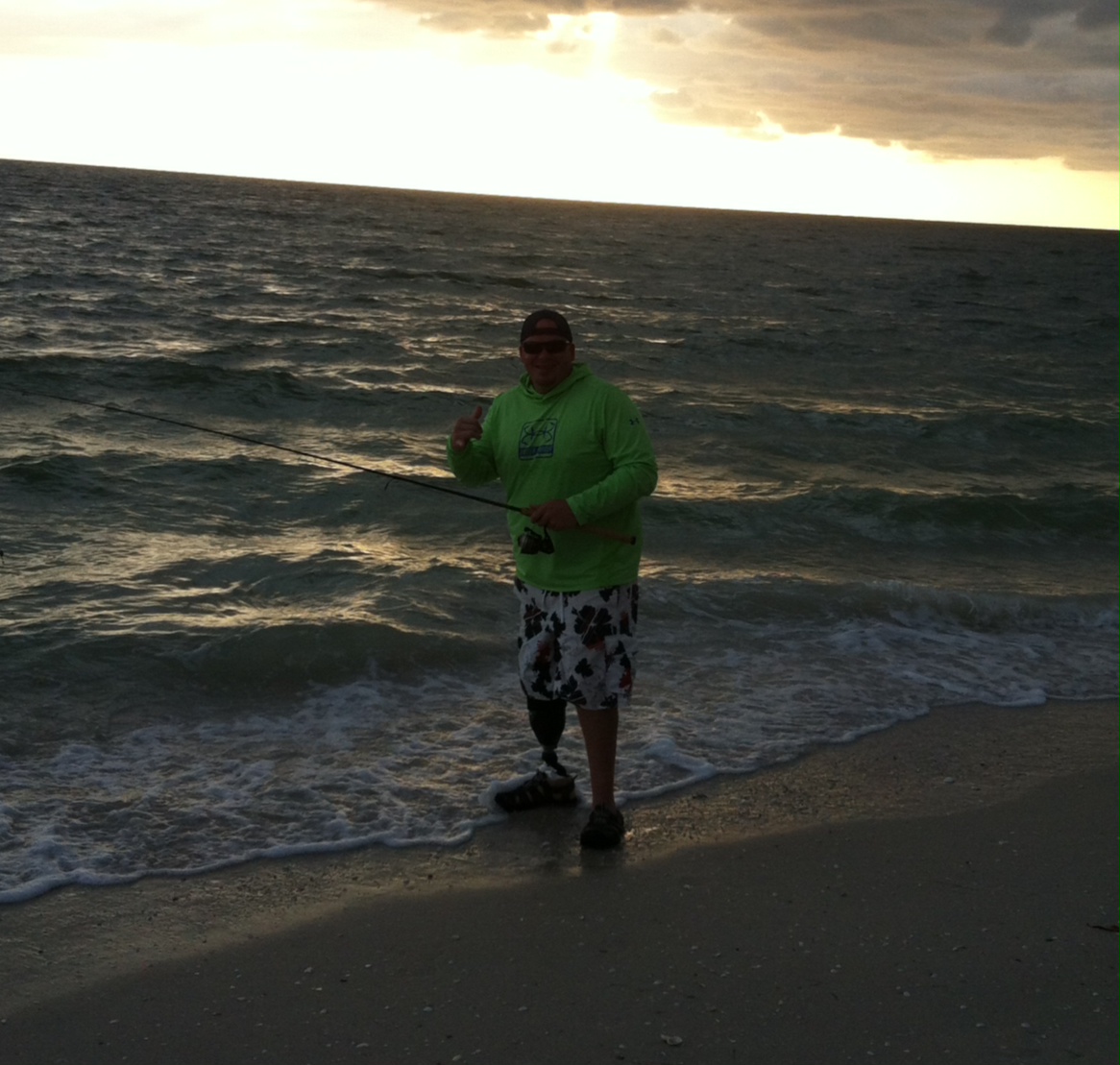
What are the three core values of your hustle and how do those values relate to your happiness?
- Honesty- Being honest with others is always important but honesty with yourself is paramount. We can talk ourselves into any excuse or negative thought pattern so easily, yet when we look in the mirror we justify it because we are not honest with ourselves. Being honest with yourself is not about condemning yourself when we don’t do our best or we mess up. It is so when we do mess up we can be honest with ourselves and come to a conclusion about how to make it right much easier and faster than if we are constantly making excuses for ourselves.
- Purpose- One of my favorite speakers Dr. Eric Thomas explains it as “know your WHY.” When we have a deep desire to accomplish something all the challenges that come our way are easier to battle if we have a vision, a purpose for the pain. Finding my “why” or my purpose has given me an understanding that for so long I didn’t have as to why I was born with Bilateral Congenital Vertical Talus. I used to think why me, why was I born with this? Why not someone who didn’t love an active sport or someone who didn’t want to be great? As I began to study my purpose I also gained understanding. I understand that my purpose was to share this story with others to provide them an example and hope. My football career ended like it did and I went down that bad road so I could go back and save other young athletes and people from doing the same thing. I can use this amputation (and possible double amputation) to show others we can get through the hardest choices and struggles of our life and yet, live in happiness with a peace about us that others want and need and we can help them attain it.
- Faith- I understand that not everyone is a person of faith and I can respect what others choose to believe in. For myself however, my faith has kept me going in the toughest times of my life. When I was living in a world of shame and addiction I still felt loved even though I couldn’t love myself. While making the choice to let doctors amputate my right foot I spent so much time in prayer and thought and was able to reach the decision to amputate with peace and no regrets. I am not saying this is what others should do or have to do but one thing I would say is find something to have faith in, something bigger than yourself. Volunteer; join an organization that is making an impact in your community and in people’s lives. When we have faith in something bigger than us it allows us to take the focus off of ourselves, we don’t think about our problems near as much and the feel good emotions we get from what we have faith in often helps provide answers for problems that do arise in our life. Those three values along with others have kept me positive, happy and driven through the biggest physical challenge of my life since becoming an amputee. I personally know others who are facing challenges much greater than mine; yet, they have remained steadfast in positivity, love and inspiration. I am learning we all have a story, we all are unique in our own way and can make a difference in others lives. It is up to us to step out on faith and become the people we want to be that makes this world better because we are in it. One great step in becoming that person is living a life of love and happiness and watching as your happiness hustle develops into a lifestyle that can and will literally change your life.
Facebook // Instagram // Email
Happy Hustler of the Month: Greg Miller
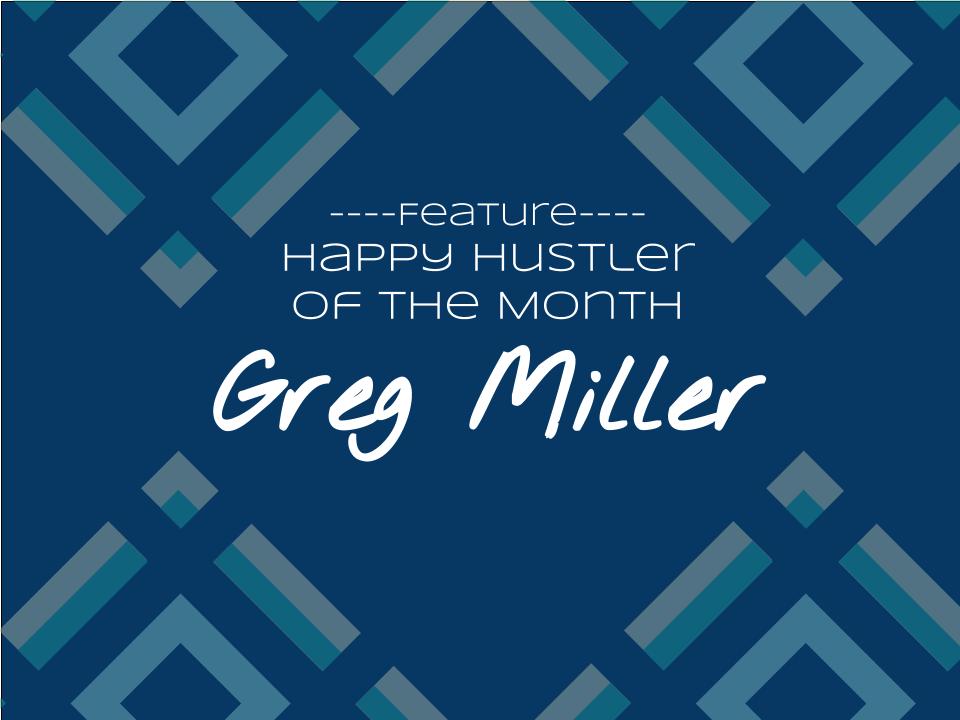
About Greg:
Greg Miller, Owner of Authentic Awesomeness, encourages people to be ‘Authentically Awesome’, by living and inspiring other to live a positive, energized lifestyle whether in sport, at work, or in everyday life; by not worrying about what others think, but improving yourself each and everyday spiritually, mentally or physically. He believes in investing our time, rather than just letting it pass. He believes in embracing our own uniqueness, our own goofy, whacky and weird selves. Greg Miller believes in embracing who we truly are without reserve, without the thought of “Is someone judging me,” because yes they are and WHO CARES!! Whether they are judging for better or worse, BE YOU!!
He is:
- Here to inspire others to be the best version of themselves.
- Master Trainer
- Motivational coach
- A 2008 10th round MLB Draft pick
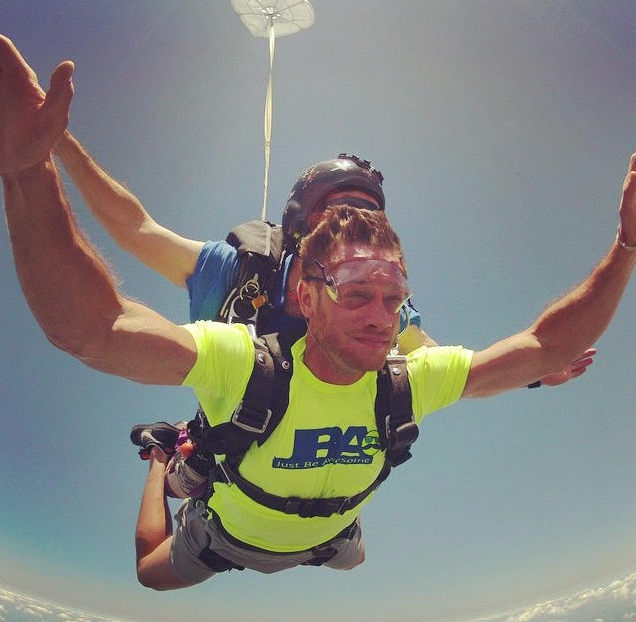
Tell us a little bit about your hustle and your happiness journey.
Where to begin, my happy hustle journey began after losing my professional baseball career due to elbow surgery and poor choices. These poor choices cost me my dream that I worked all my life to achieve. I even wrote a poem about it and the poor choice. My journey of a happy hustler didn’t begin so “Happy” per say as I battled a strong addiction to pain pills and opiates in general.
I was in and out of rehab for several years, lost in the grips of space and time withno direction, no goals, and a will to live that became completely stripped. It was not until my best friend Ezekiel Boren, entered my life and told me exactly what I needed to hear, the TRUTH. I had become so accustomed to being Greg, “The baseball player,” that I had no identity anymore. I just lied to myself about who I was, and was living this unauthentic, self-deceiving type of lifestyle and mindset. It was not until I made a conscious CHOICE, to choose a different way; to think different thoughts; to FUEL my mind with positive thoughts and feed those thoughts that aligned with my true self, my AUTHENTIC self, that I began to RECREATE who I was and ultimately begin to build my own AUTHENTIC AWESOMENESS…. And that is how our company began - through finding my own Gratitude and Love for myself, which is the foundation for what our company represents. Gratitude, Self-Love and Self-Empowerment!
What do you do to de-stress after or during a long, stressful day?
I do a lot of meditation, even just sitting at my desk, I will close my eyes, count my breaths for some time, get myself centered and continue on with my day. It is very relaxing and calming - relax the mind and RELAX THE BODY! Working IN and not just working OUT, the body only does what the mind tells it to do. Because of this we call our workouts, workINs because it all starts with a mindset - it all starts WITHIN!
My favorite workout is to hang my Olympic rings in nature, on a big branch, or under a waterfall like I did in Shenandoah National Park in Virginia. I create a little circuit and get after it.
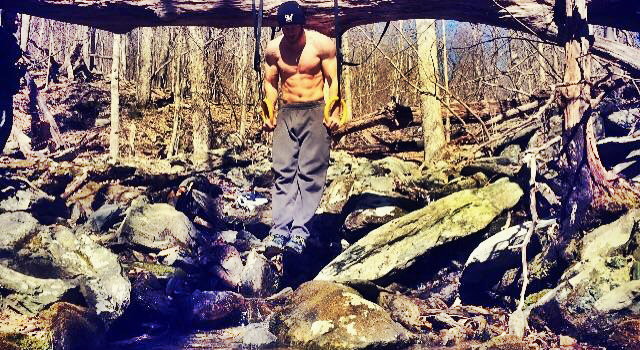
Where do you go for inspiration?
For inspiration I go to nature and connect with the things that are greater than myself. I also listen to a lot of motivational speakers, Tony Robbins is classic, but also guys like Eric Thomas, Bob Proctor, Dan Pena and many others.
What are you currently reading or listening to (podcasts, books, blogs, etc.)?
Currently I have just finished the “Three Pillars or Zen” by Philip Kapleau and am re-reading “Think and Grow Rich” by Napoleon Hill. I find that life is a lot about repetition, and enhancing what already IS. Re-affirming and re-instilling what works, especially if we begin to lose our balance and our “way” so to speak. One other book, the one that changed my life is “As a Man Thinketh,” by James Allen. I listen to it in my car, before I go to sleep. It is awesome.
What is one piece of advice you'd give to someone just starting their happy hustle journey?
If there was just ONE piece of advice haha, even though that’s very limiting because there are infinite things to give for advice; I would have to say Perseverance. Life is not all rainbows and butterflies, and it is how we RESPOND to life challenges, as opposed to how we REACT to them. They say life is 10% what happens to you and 90% how you respond; I have to disagree because life is ALL about how we respond to certain circumstances and people in our lives. Life is going to happen regardless.
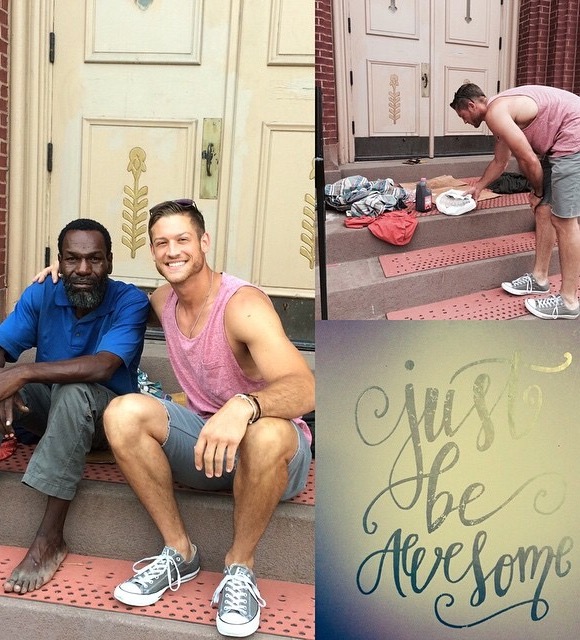
What are some of your favorite quotes or words to live by?
Well I love Muhammad Ali’s “The man with no imagination has no wings,” this one is awesome. But I am a big Ralph Waldo Emerson fan and he has two quotes that stick out to me, one being “To be yourself in a world that is constantly trying to make you something else is the greatest accomplishment,” and also “Write it in your heart that everyday is the best day in the year.” But I also love ANY Bruce Lee quote, I can go on and on about quotes. Buddha is also one of my favorites and the fact is what we think, we ultimately do become. One of my favorite personal quotes is “Best Day Ever!” or BDE. Very similar to Emerson’s quote, but it means that each day is the best and only day, all we have is the HERE and NOW moment. There is no yesterday, there is no tomorrow…. There is only this current breath and current moment at hand and to live each day as its own “rebirth” so to speak, almost like being resurrected each morning, into a new day, a new opportunity to be BETTER than we were the day before.
 In one word, sum up your life as a Happy Hustler.
In one word, sum up your life as a Happy Hustler.
AWESOME!!!
What are the three core values of your hustle and how do those values relate to your happiness?
Gratitude, Love and Humility.
These values are what allow more good to flow in my life. If we are our thoughts, then what we think we attract, so it comes down to what we choose to focus our energy on. I choose to focus my energy on being grateful, not only for what I DO have, and also being grateful for all future moments and things that will have, as well as what I have had in the past. Love is just a state of being for me. Loving myself first so that I may spread love to all others and Humility is just as simple as that. Being humble and realizing we don’t know, life is mostly a matter of opinion and perspective with very little truth. The only TRUTH we know of is the one we live, otherwise, we are all on the same journey looking to figure out the same things and which way is best to do this or do that…. Life is about trial and error and being humble enough to take risks, fall down, and be able to get back up that much better, that much stronger the next time… That’s what life is to me and why humility is so important.
Connect with Greg:
Website // Facebook // Instagram
Know someone who we should feature? Nominate them here!
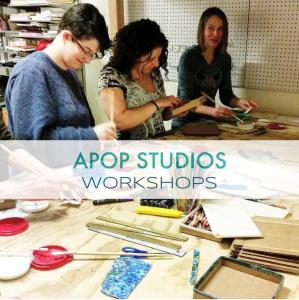
This feature was sponsored by APOP Studios’ Feeling Salty Workshops. Schedule your workshop today to let go of that negative baggage and build a happier you! Great for work and school events. Email info@apopstudios.com or find more information at: www.apopstudios.com/movingmindfully
Rest Day Recipe: Yogurt & Jessica's Natural Granola
https://youtu.be/NODy0Gyj3HY
Happy Hustler of the Month: Luiza Cardenuto
Luiza Cardenuto is a Philadelphia Artist and Art Educator who believes art can be anyone's source of happiness and peace. She has exhibited in public urban spaces as well as traditional galleries all over the U.S. and abroad.
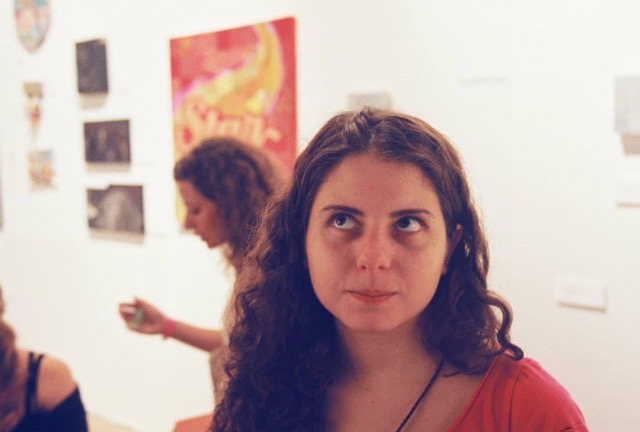
Tell us a little bit about your hustle and your happiness journey.
I am an artist, but I wasn’t always one. I battled with the decision to become one for quite sometime growing up. I did not fit in. I felt misunderstood. I simply had no other interests besides drawing and when I moved to USA at age 16, I was officially labeled a misfit. I was a super shy immigrate from Brazil, who didn’t speak English well, didn’t understand the culture, yet the punks, cubans and goths in my high school came to my rescue. The rest was history; I became an artist. I made jewelry all the time, and sold it at my school. Quickly, I became known as the Brazilian Hippie girl who makes art.
Art school seemed to be a given and the only option at this point. First, I got my AA in Miami, then I headed off to NYC to pursue my calling...and my BFA.
When I graduated art school I had a strange, eerie feeling that the art world was not for me. Nevertheless, I kept going even though I was disenchanted. I still am. But, art is here, art is always here. I think that creativity has saved me and kept me sane.
Now, I am in Philly where I make art and teach art 24/7. It doesn’t get much better than that!
What do you do to de-stress after or during a long, stressful day?
I have to do yoga everyday now that I am 26. I feel that my body is getting stiffer by the minute. So I stretch and pull, I bend and bounce. It’s what keeps me moving and what keeps me smiling.
Where do you go for inspiration?
To get started at the studio, I have been getting into meditation. I typically do about 20 minute sessions. My mind is an interesting place to go.
There’s also nothing better than traveling, I go back to Brazil every chance I get as well as visit somewhere new every year. I love to be outside, to see different plants, to look at the sky and experience nature. She’s the ultimate teacher and inspiration.
Lately, I have also been going to the Mutter Museum in Philadelphia, and the Natural History Museum in NYC. I live for that stuff.
What are you currently reading or listening to (podcasts, books, blogs, etc.)?
I listen to a lot of lectures from philosopher Alan Watts and Terence McKenna.
I watch the occasional TED talk, some videos by Jason Silva and I get my comedic relief from Porta Dos Fundos, a brazilian comedy Youtube channel.
I recently discovered the magical world of comics. I’ve been buying graphic novels to read by Scott McCloud and others. I’m also a sucker for National Geographic magazines, I love their photography.
As for books, I am reading “A Brave New World” by Aldous Huxley again. My all time favorite book is “fahrenheit 451” by Ray Bradbury.
What is one piece of advice you'd give to someone just starting their happy hustle journey?
I’d say- look deep within. There’s always something new to learn about yourself. Make it fun and interesting.
What are some of your favorite quotes or words to live by?
“Change is the only Constant” - Heraclitus
“There’s always spring after winter” -Buddha
“Trying to be happy by accumulating possessions is like trying to satisfy hunger by taping sandwiches all over your body.”- George Carlin
In one word, sum up your life as a Happy Hustler.
Steep.
What are the three core values of your hustle and how do those values relate to your happiness?
- Fulfillment (if it doesn’t fill, it doesn’t spill)
- Whatever I do, I always ask if I feel fulfilled when doing it. I think it is important to check in with myself and see where the urge comes from.
- Persistence (measure once, cut twice, and vice-versa)
- I am definitely a mistake-making-machine. Often the same ones. But persistence is like the oil that keeps the tin-man going, so he can get nickel-plated by the Wizard in Emerald City...right?!
- Lightness (life ain’t so serious)
- I’ve learned to take things lightly by letting go of control. I live with a certain level of detachment that I think is necessary to keep my sanity.
Connect with Luiza:
Website / Facebook / Instagram

This feature was sponsored by APOP Studios’ Creative Stress Management Workshops. Schedule your group stress management workshop today! Great for work and school events. Email info@apopstudios.com or find more information at: www.apopstudios.com/movingmindfully.
How to take control of your happiness

In a world where the hours, minutes, and seconds of our days are constantly monitored and accounted for--when do we step back and focus on the “me” portion of the day?
According to Mental Health America anxiety disorders are the most common mental illness in the United States, and affect almost 20% of the population over the age of 18. Those numbers are scary, right? Let’s take that twenty percent and add that to the rapidly rising number of adolescents facing the same anxiety disorders--another 35% on top of the adult population!
We are all busy. We are all trying to find a “quick fix”. We are all surely wanting the easiest and most hassle-free way to find the happy in our own lives. That’s a huge reason why The Washington Post has cited that the 150 BILLION dollars that the U.S. spends on their mental health is only rising.
The cheapest alternative to expensive therapies and medications? All sources point to daily journaling. If you’re anything like us, after an overwhelming day--the last thing we want to do is sit and journal about our feelings. Journaling and tracking your happiness along with the daily factors that influence that state of being have been proven to help manage anxiety, reduce stress, and cope with depression. Add in the facts that tracking things like your sleep, mood, and overall well-being make you a well balanced human being, and the pros definitely outweigh the cons.
 The Happiness Tracking Journal is the antithesis of traditional emotional or therapeutic journaling.We found a way to reap all of the benefits of daily journaling, and streamlined it for you. The entire week is on one clean and minimalistic page, so you can physically and tangibly see where you are at your happiest. Keeping things short, sweet, clean, and to the point is what sets the Happiness Tracking Journal apart from other methods. Have a weird part of your day you want to record? So did we, so we made it entirely customizable.
The Happiness Tracking Journal is the antithesis of traditional emotional or therapeutic journaling.We found a way to reap all of the benefits of daily journaling, and streamlined it for you. The entire week is on one clean and minimalistic page, so you can physically and tangibly see where you are at your happiest. Keeping things short, sweet, clean, and to the point is what sets the Happiness Tracking Journal apart from other methods. Have a weird part of your day you want to record? So did we, so we made it entirely customizable.
You can download the Happiness Tracking Journal from TheAPOPShop on Etsy, and instantly begin to track your well-being, and start your new path to positivity.
How to live a well balanced life (Part I)
https://www.youtube.com/watch?v=ED3dOhDn4SY
First Friday Feature: Leah Koontz
This First Friday APOP Studios is celebrating the work of Philadelphia Artist, Leah Koontz. Her work directly relates to equality and the marginalized--demanding she and society as a whole are progressive and forward thinking through the critique of societal standards and beliefs. She has exhibited many places in Philadelphia among which include, New Boon(e), The Galleries at Moore, and The Water Gallery. She has also shown at the Ice Cube Gallery in Denver. She received the Sarah Peter fellowship from MCAD and has been published with Cleaver Magazine and The Philadelphia artblog.

Leah's Statement
"I make work about equality because I feel that this is my duty as a contemporary artist and engaged citizen. I am particularly interested in challenging American society's perception of marginalized groups. I also explore collaboration and growth. It is important for me to consider the tension and possible space for growth which happens among people as they attempt to communicate. I routinely think about my position, with respect to balance and control, as well as society’s relationship to these ideas. I want my art to contribute to learning and conversation, which hopefully spawns from my viewer’s experience. My work deals with themes of excess, conformity, and deterioration. Material is usually the byproduct of an idea. I enjoy working with a range of mixed media and genres to build a vessel for my thoughts as well as combining the grotesque with the seductive."
https://youtu.be/fV5TsL4uCnk
APOP Studios Feature: Lucy Smith
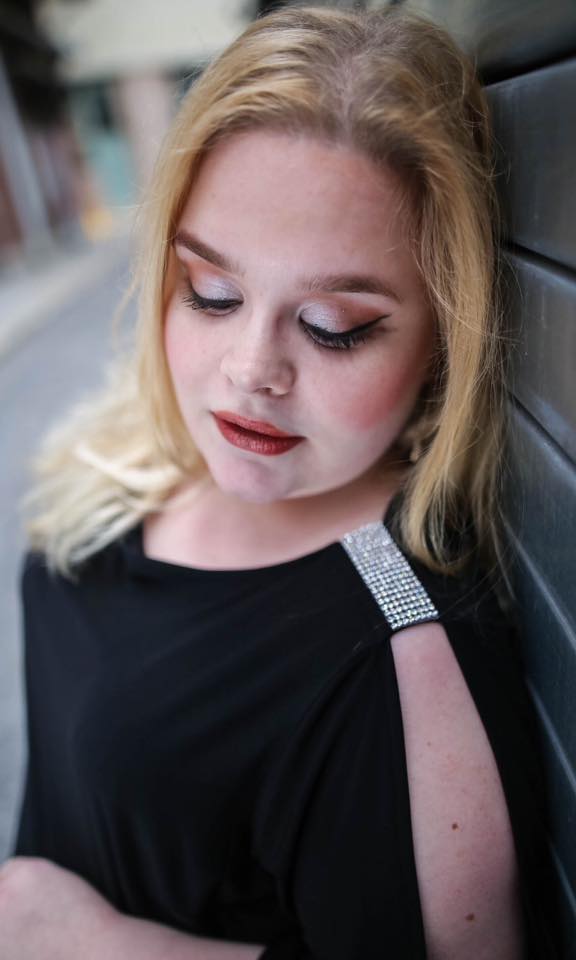 Name: Lucy Smith
Age: 26
Name: Lucy Smith
Age: 26
Original Goal: Getting rid of her Imposter Syndrome. Lucy describes it as that feeling when you are applying for a job and think to yourself, “Oh that has a few things I might like, but I can’t do all of it so I shouldn’t apply for it.” The constant feeling of someone else being more qualified than ourselves.
Today’s Goal: To get rid of Imposter Syndrome all together.
Advice: “You are never alone. You are going to find support no matter what, but support really starts within yourself.”
Story:
As human beings, the way that we are raised says a lot about the problems and insecurities that many of us face as adults. For Lucy, growing up as the daughter of a very southern conservative father, and a liberal mother was a constant challenge. As a self-proclaimed hardcore liberal, Lucy and her father clashed heads a lot growing up. However, this tug and pull relationship with her father is what she credits a large part of her finding such self assurance and confidence in her young adult life.
One of the biggest hurdles that Lucy faces day to day is her body. With a smaller, more petite frame but not falling into the “slender” category, she has faced a lot of negative backlash for her silhouette and body type.
“People are like, ‘oh you’re fat’ because I’m not slender. People automatically think it’s a bad thing-- but I mean, being fat is an adjective. To me, it’s just a descriptor.”

One of the ways that Lucy has come to accept her body image was through a stint of time that she spent burlesque dancing. Being able to go up on stage and improv was something that really helped to build Lucy’s self confidence. People really supported her burlesque dancing, and one of the more defining highlights of her time spent dancing culminated after one of her performances. “A woman came up to me and said, ‘ I didn’t know people like you could be sexy. You showed me that.’ It was great, it was wonderful.”
Using social media as a platform to discuss fat positivity and Imposter Syndrome has also been very cathartic for Lucy on her journey to loving herself. Lucy uses her social media pages to help bring awareness and draw community together around those dealing with their journeys to self love and worthiness. The internet is a massive tangle of people, so finding others that are in need of support and hope is not something that is hard to find. Although it’s certainly a cathartic experience for Lucy, to be able to help others on their journey to beating their own versions of Imposter Syndrome.
“In my opinion, it’s more important to be proactive and stand up for yourself and say the unpopular things, because somewhere along the line someone else agrees with you.”
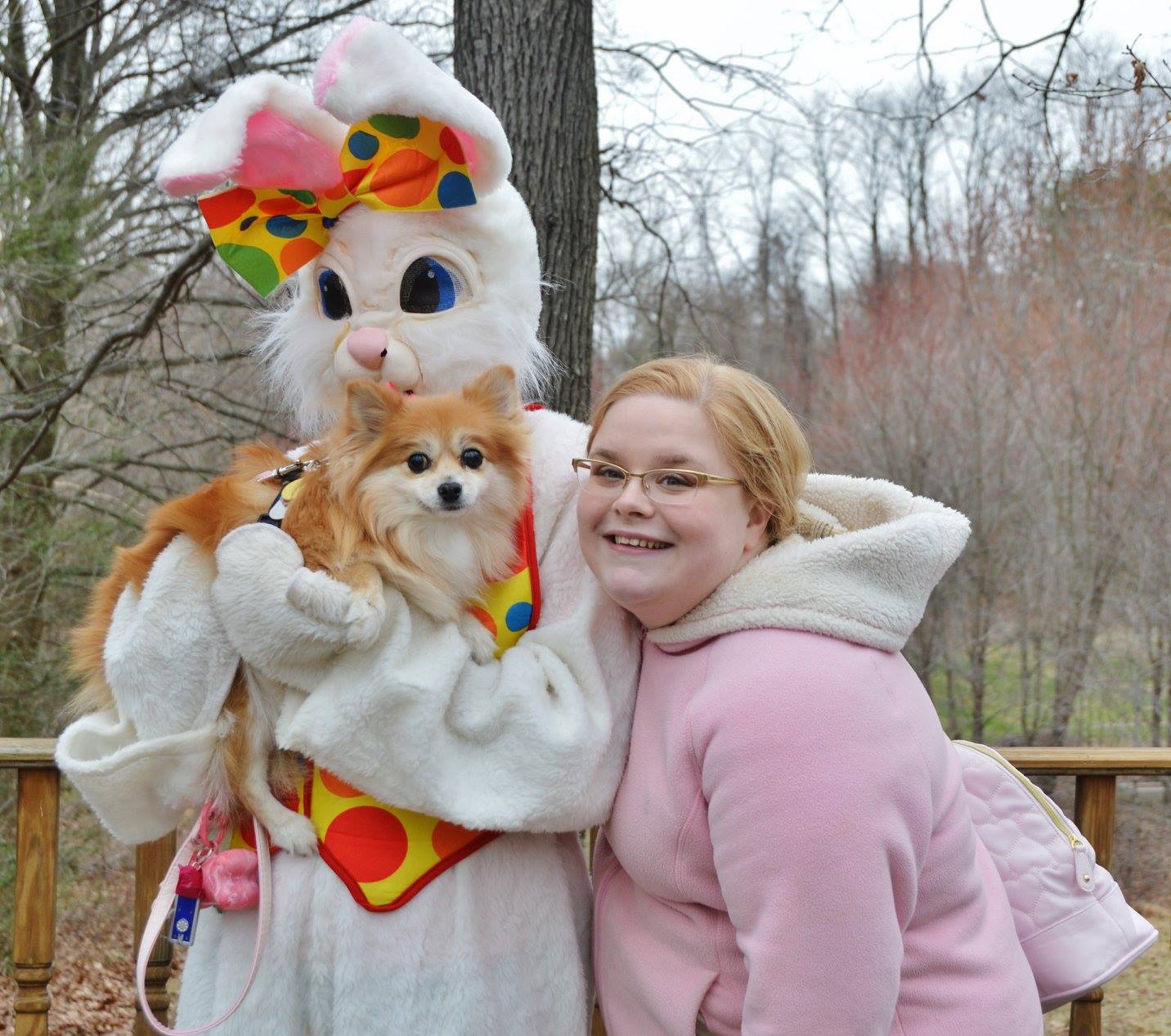 One of the defining moments in Lucy’s journey came several years ago when a family member slipped her an informational pamphlet about Cryosurgery. Cryosurgery: surgery using the local application of intense cold to destroy unwanted tissue. In most instances the unwanted tissue are localized fat cells.
One of the defining moments in Lucy’s journey came several years ago when a family member slipped her an informational pamphlet about Cryosurgery. Cryosurgery: surgery using the local application of intense cold to destroy unwanted tissue. In most instances the unwanted tissue are localized fat cells.
Lucy was having trouble fitting into the clothes that she wanted to, and her silhouette was not what she wanted it to be. Working hard in the gym was having no results on the lover stomach bulge that she wanted to eliminate. When in theatre school, a professor encouraged her to get into good cardiac shape to be able to make it through a two and a half hour show. Even after doing forty-five minutes on an elliptical every day, she was seeing results everywhere on her body BUT her lower stomach.
After doing all of her research on Cryosurgery/Coolsculpting she decided to go and do the surgery. Lucy describes the process like having your skin sucked into a high intensity vacuum. After her treatment, Lucy had bruises where the coolsculpting had been performed.
“I wanted to improve my silhouette because I knew that this was stubborn fat. Because of my circumstances, I was eligible for this treatment because when they touched my stomach...when they grabbed it...they said that it was really soft so the treatment would work.”
The surgery was a real turning point in helping to motivate Lucy to begin to exercise more. Before she underwent the coolsculpting Lucy had been having no success with working out to help achieve the look she wanted. With the fat cells removed, she was starting to see tangible success with working out.
“It’s worth saying that I loved and will continue to love my body no matter what my stomach looks like- but I got my silhouette changed because of my own preference. It is not anyone's prerogative to judge anyone else's body based on their own individual preferences...My shape is more appropriate for my body now. I don’t feel like anything is out of shape, or place. That’s what motivates me to get out and exercise.”

Lucy has learned a lot through her journey, but one of the best things she has gleaned from her ups and downs has been just how important being more assertive is for her well-being.
“Getting rid of that little voice in the back of my head telling me that nobody wants to hear what I have to say. Being more positive and extending that generosity to others. If negativity can’t be influenced by positivity, it might be best leave that conversation or that person behind.”
Now Lucy is exercising two days per week in addition to light walking around the city of Philadelphia. She has achieved her own personal preferred silhouette and has changed her outlook on life to reflect a mindset of happiness. In addition to her physical and mental health achievements, Lucy is also on her way to academic and entrepreneurial success. Lucy is a graduating senior illustration student at Moore College of Art & Design, running her illustration business Lucy Smith Illustrations, and a weekend business venture “Snow Princess Parties.”
Q&A:
Can you explain more about Cryosurgery?
I guess the technical term is coolsculpting, because it freezes the fat cells. When it freezes them, it kills them. The fat cells don’t grow back unless you really go all out with your diet/lifestyle, but for the most part they never come back. On average it takes about one hour per section for treatment. They cover your skin in a gel, so that the sucking of the vacuum doesn’t really hurt.
How do you stay active?
I love walking all around the city. When I come back at night, I’m like “that was really fun AND I walked all around the city AND I got to pet dogs in Rittenhouse Park.” I can do all of those things now while exercising.
How did this surgery change the way you look and relate to your body?
It has really motivated me to exercise. Before, my body would look the same after three months of real exercise and I would just feel like, “What’s the point?” I feel more free. I can walk around and not feel self-conscious about my lower stomach. I can walk around with so much more confidence.
When you find yourself in a negative mindset how do you get out of that?
Start thinking of all the things that I am grateful for. My family had a house fire last year, and we are still hanging in there and plugging forward. People ask me, “How can you be so confident?” I say it’s because I love myself, and a lot of people don’t. What are a few things you’re grateful for?
My health, mentally, emotionally, and physically. I’ve lost four pounds. My family. My dog Ruby, she’s my daughter.
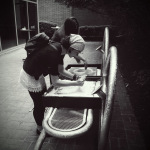 This feature was sponsored by APOP Studios’ Creative Stress Management Workshops. Schedule your group stress management workshop today! Great for work and school events. Email info@apopstudios.com or find more information at http://www.apopstudios.com/movingmindfully.
This feature was sponsored by APOP Studios’ Creative Stress Management Workshops. Schedule your group stress management workshop today! Great for work and school events. Email info@apopstudios.com or find more information at http://www.apopstudios.com/movingmindfully.
Find Out What Makes You Tick!
https://youtu.be/21PbCyiYhGg Learn how to track important mood influences such as sleep, exercise, meditation, etc and can be customized to fit your personal needs. By tracking these key influences and you happiness for a month or more, you can find out what REALLY makes you happy.
Using this tool I've discovered fabulous data about my own happiness--I learned I tend to be happiest and Thursdays and Saturdays, that I'm 11% happier when I exercise AND 10.3% happier when I perform a moving meditation activity (making art, going for a run, knitting, etc.)
FREE APP: Journey (https://chrome.google.com/webstore/de...) TEMPLATE: Happiness Rating: __ out of 10 Sleep: __ hours Exercise: Yes/No Meditation: Yes/No Moving Meditation: Yes/No Notes:
Is there anything else I should be tracking? Let me know in the comments below :)

This feature was sponsored by APOP Studios’ Creative Stress Management Workshops. Schedule your group stress management workshop today! Great for work and school events. Email info@apopstudios.com or find more information at http://www.apopstudios.com/movingmindfully.
APOP Studios Feature: Jayden Phillips
Subject: General Self-Improvement
Original Goal: To lose weight and gain muscle
Today’s Goal(s): To make it a point every day to positively affirm himself and do things that take him out of his comfort zone so that he can continue to grow as a person both mentally and physically.
Advice: “Be true to yourself and love yourself first. Don’t be afraid to be different because that difference is in fact what makes you special.”
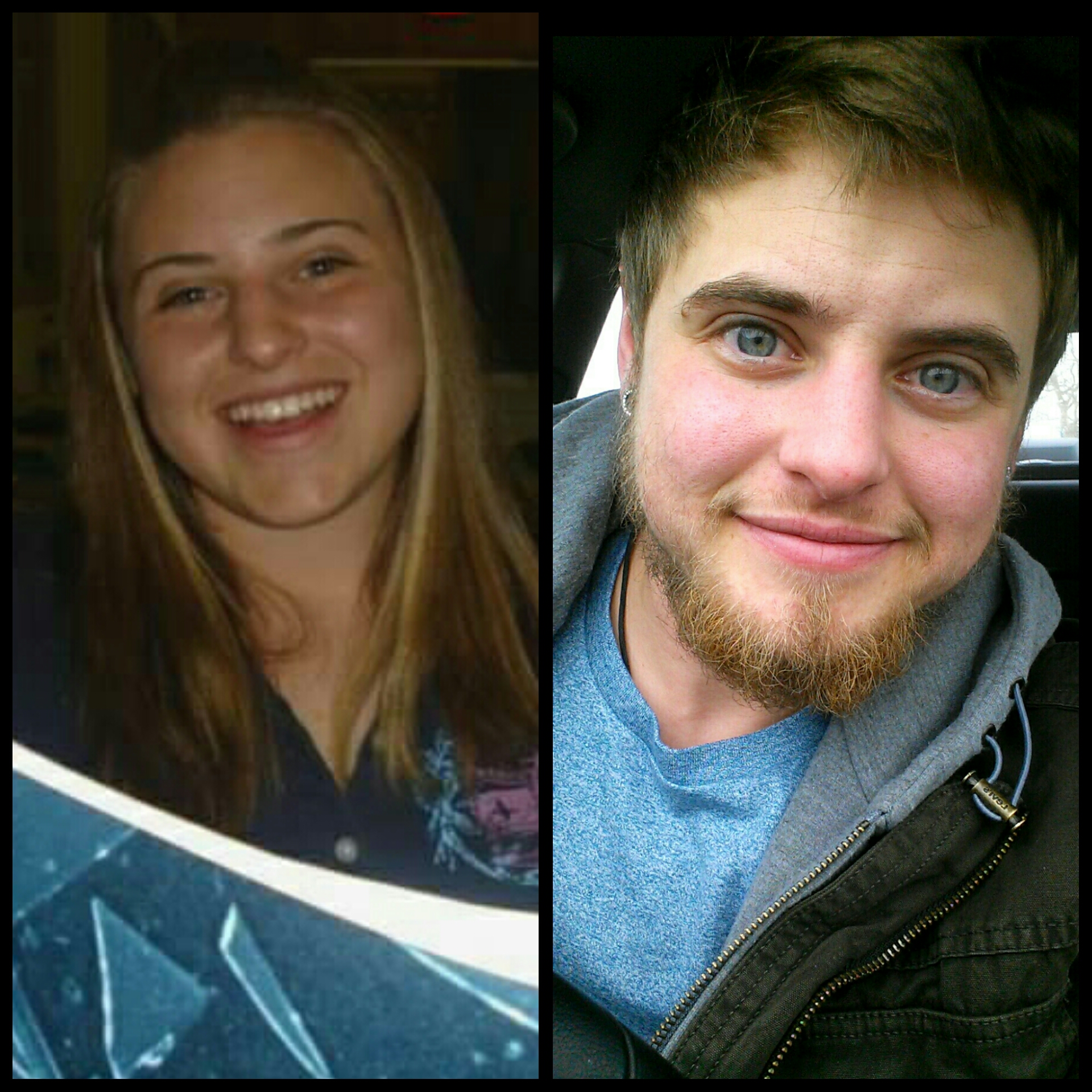 Story: Growing up, playing sports was Jayden’s passion. He was involved with six different teams throughout middle and high school - three traveling teams and three school teams. Not only did Jayden play softball and field hockey, but he was good - so good he went on to play Field Hockey at the Division I collegiate level. He played for two years until he had to make the difficult decision to leave the University. Jayden knew he needed to find himself help so he voluntarily admitted himself to the hospital for self-injury and suicidal ideation.
Story: Growing up, playing sports was Jayden’s passion. He was involved with six different teams throughout middle and high school - three traveling teams and three school teams. Not only did Jayden play softball and field hockey, but he was good - so good he went on to play Field Hockey at the Division I collegiate level. He played for two years until he had to make the difficult decision to leave the University. Jayden knew he needed to find himself help so he voluntarily admitted himself to the hospital for self-injury and suicidal ideation.
He had suffered from both since he was 17. Over the years, he had gotten pretty good at hiding his true feelings from those in his life. In hindsight, he says his depression was written all over his face and etched onto his skin all over his body. He felt guilt and shame for the harm he caused himself and he didn't understand why he felt the need to engage in harmful behaviors. Now, he recognizes that self-harm was a means of escaping his emotional pain. In his eyes, his mental suffering was, by far, worse than the physical pain he caused himself regularly.
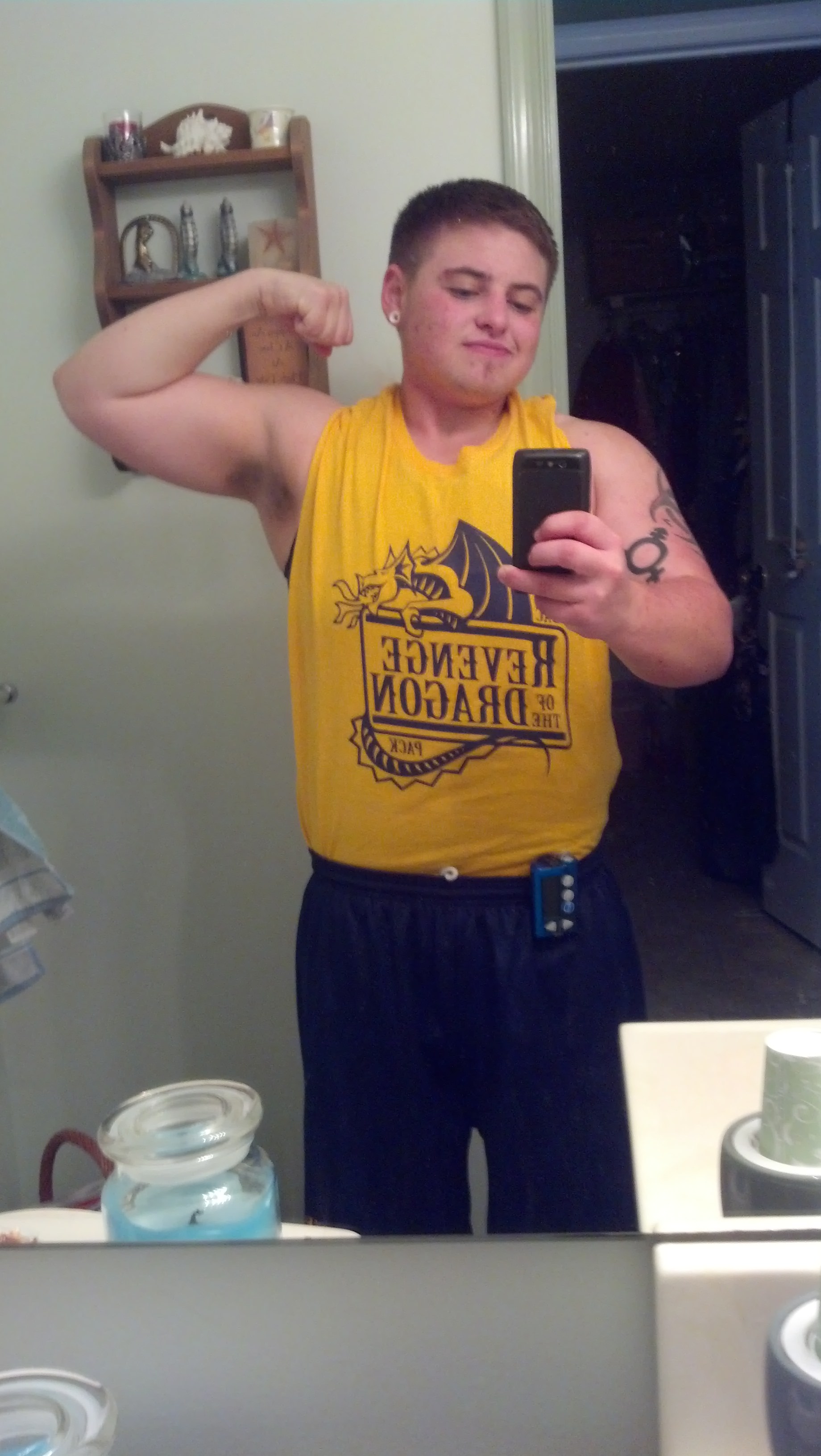 What caused this emotional turmoil? Jayden’s sexuality. It was what consumed his thoughts and overwhelmed his mind during this time in his life. Being outside the hetero-normative had and still has a cultural stigma. At 12 years of age, Jayden remembers the first time he acknowledged his attraction to the same sex; he didn't dare share those thoughts with anyone--at least not for a few more years. It wasn’t until he turned 17 that Jayden, a high school senior at the time, boldly came out as bi-sexual. Struggling to adjust to the strong opinions and hatred he perceived from the world, self-harm became part of his everyday routine. From 17 on, Jayden struggled, but not alone; he had a support network of family, friends and professionals. Therapy was an important part of working out his own internalized issues with sexuality. Therapy helped Jayden do some introspection for more answers during college and this process led him to begin to identify as gay at the age of 19. With the transitioning from one label to another more appropriate label, Jayden found a sense of relief, but he knew that label wasn’t quite right.
What caused this emotional turmoil? Jayden’s sexuality. It was what consumed his thoughts and overwhelmed his mind during this time in his life. Being outside the hetero-normative had and still has a cultural stigma. At 12 years of age, Jayden remembers the first time he acknowledged his attraction to the same sex; he didn't dare share those thoughts with anyone--at least not for a few more years. It wasn’t until he turned 17 that Jayden, a high school senior at the time, boldly came out as bi-sexual. Struggling to adjust to the strong opinions and hatred he perceived from the world, self-harm became part of his everyday routine. From 17 on, Jayden struggled, but not alone; he had a support network of family, friends and professionals. Therapy was an important part of working out his own internalized issues with sexuality. Therapy helped Jayden do some introspection for more answers during college and this process led him to begin to identify as gay at the age of 19. With the transitioning from one label to another more appropriate label, Jayden found a sense of relief, but he knew that label wasn’t quite right.
“None of these labels on my sexuality ever felt completely right. I still felt lost. I still felt different. I still felt that there was something else missing.”
After leaving college Jayden met a girl whose friend was transgender and after getting to know him found that the similarities within their lives were unprecedented. This man opened a whole new world of possibility and he gave Jayden the knowledge and the language that he would have otherwise never been exposed to had they not met. Jayden began to understand that he was not alone in his thoughts and in his feelings. “It all made perfect sense,” he said. As a young child he was constantly asking questions like, ‘Why can’t I be like the boys?’; ‘Why can't I wear a suit like the other boys making confirmation at church?’; ‘Why can’t I play football?’; ‘Why can’t I stand to pee?’ The questions and conversations went on and on. He didn't like pink, purple, or butterflies; He associated those things with girls. He wanted things that boys played with, used and wore. Society told him that as a female he was supposed to like all these things. Society told him to do all these feminine things, but the truth was that those things didn’t suit his interests. “I always felt different from all the other girls, and I was,” he said.
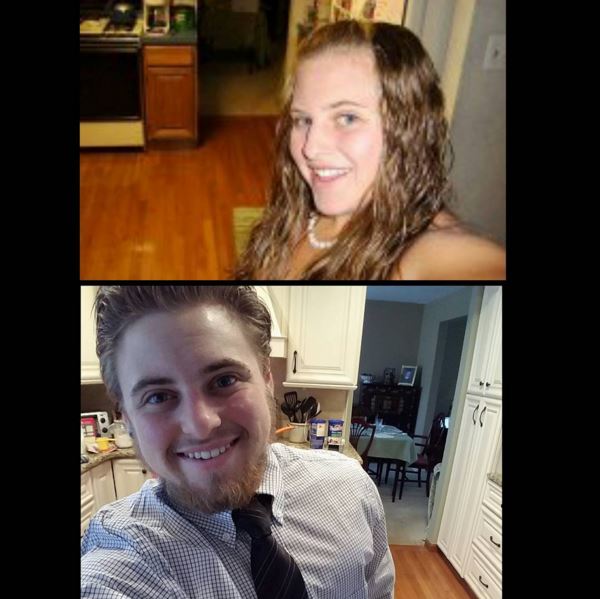 Although sexuality played a part in his internal struggles growing up, gender identity was ultimately the reason behind Jayden’s pain. At the age of 21 he came out as transgender with a fully supportive group of family and friends. This support made his transition from female to male much easier. What’s more, Jayden makes it clear that he couldn’t be more thankful to those in his life for that support, patience and acceptance.
Although sexuality played a part in his internal struggles growing up, gender identity was ultimately the reason behind Jayden’s pain. At the age of 21 he came out as transgender with a fully supportive group of family and friends. This support made his transition from female to male much easier. What’s more, Jayden makes it clear that he couldn’t be more thankful to those in his life for that support, patience and acceptance.
After extensive research about local transgender care, Jayden decided to go to the Mazzoni Center, a LGBT health services office in Philadelpia, PA. He had two initial doctors appointments at the Mazzoni Center before being prescribed testosterone--one with a Trans intake specialist and another with a doctors to go over his bloodwork and the Mazzoni’s ‘informed consent’ policy of care, which was to ensure he was aware of what he was about to do. Another requirement before treatment was a letter from his therapist validating that he in fact suffered from gender dysphoria and that hormone treatment was the next necessary step. On August 12, 2012 Jayden gave himself his first shot of testosterone which he now takes once a week subcutaneously (into fat).
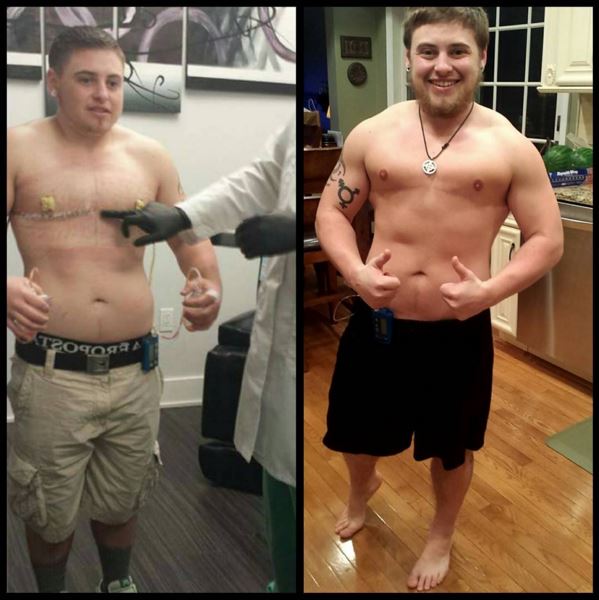 At 5 feet tall and 180 lbs, Jayden was looking to masculinize his figure. His primary goals were to lose weight and gain muscle in preparation for his chest surgery, essentially getting his body in the best shape he could beforehand. Cardio helped him shed some of those unwanted pounds, but he makes it clear that he was never one to run; he never had good stamina. After an important shift in mindset, Jayden dedicated himself to the gym so he could not only achieve his physical health goals, but also achieve goals pertaining to his own wellbeing and happiness. He did cardio almost every day along with weight training up until the date of his chest surgery. In January 2014 Jayden traveled with his parents to Fort Lauderdale, Florida to undergo female to male reconstructive chest surgery. This consisted of a double mastectomy and resizing of the nipples, as male nipples are generally smaller than females’. The procedure went well and set him on a path to be clear for activity in six short weeks. After he did the necessary resting, he jumped back into the gym-- this time with even more confidence. He was constantly releasing endorphins and losing weight. At 140 lbs he was feeling wonderful.
At 5 feet tall and 180 lbs, Jayden was looking to masculinize his figure. His primary goals were to lose weight and gain muscle in preparation for his chest surgery, essentially getting his body in the best shape he could beforehand. Cardio helped him shed some of those unwanted pounds, but he makes it clear that he was never one to run; he never had good stamina. After an important shift in mindset, Jayden dedicated himself to the gym so he could not only achieve his physical health goals, but also achieve goals pertaining to his own wellbeing and happiness. He did cardio almost every day along with weight training up until the date of his chest surgery. In January 2014 Jayden traveled with his parents to Fort Lauderdale, Florida to undergo female to male reconstructive chest surgery. This consisted of a double mastectomy and resizing of the nipples, as male nipples are generally smaller than females’. The procedure went well and set him on a path to be clear for activity in six short weeks. After he did the necessary resting, he jumped back into the gym-- this time with even more confidence. He was constantly releasing endorphins and losing weight. At 140 lbs he was feeling wonderful.
Since hitting that 40lb mark, Jayden has gained 10lb, but one thing sets him apart: his mindset. He is persistent in reminding himself that his journey isn't over and, in fact, it will never be over. His journey to his best self is just that, a journey. He believes that if he remains positive and motivated he can achieve anything he sets out to do including staying disciplined in the kitchen and getting back to where he wants to be on the scale. Although, he says, “It’s not always about the number, it’s about how you feel”.
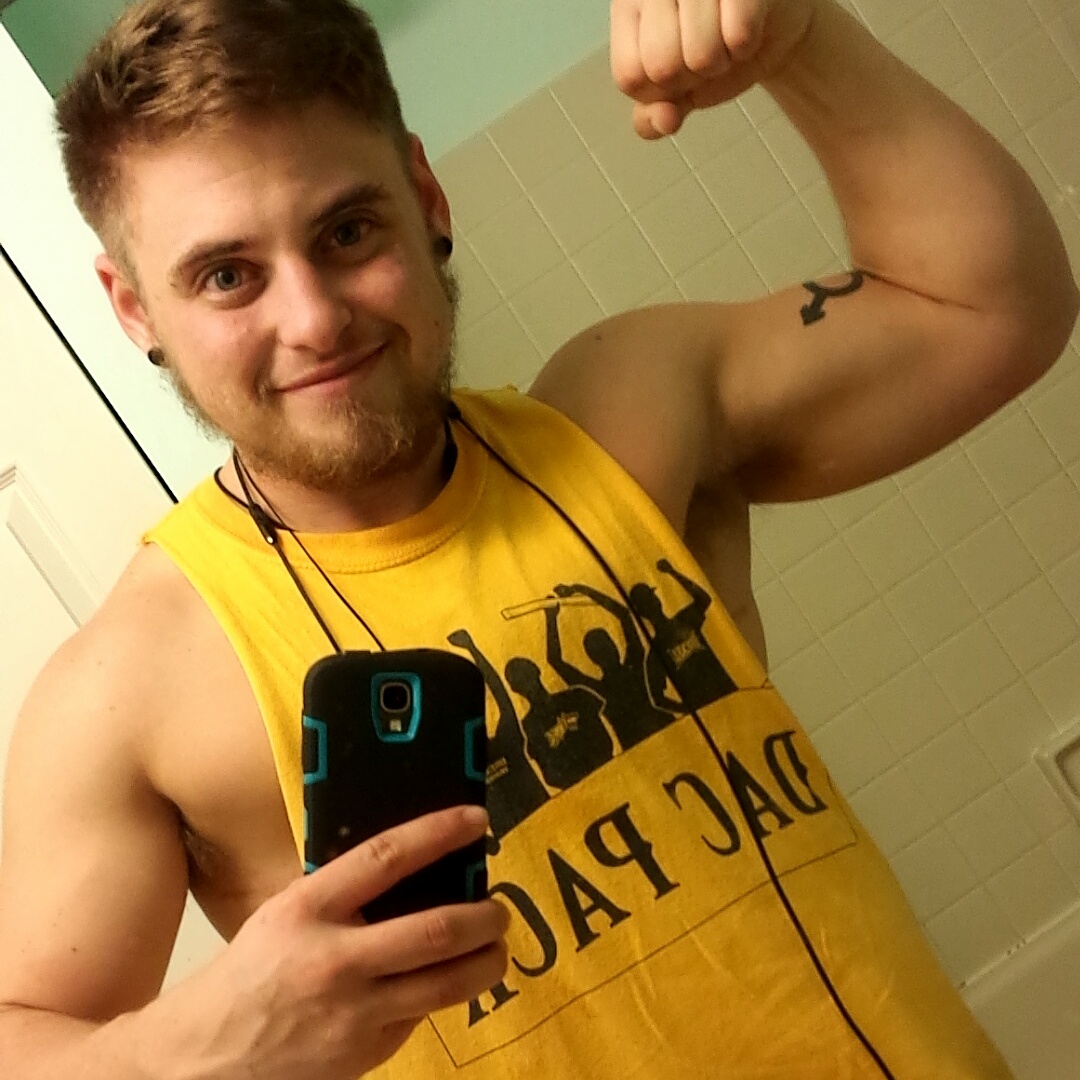 Additionally, Jayden is motivated to stay healthy as he is a Type 1 Diabetic. He was diagnosed with Type 1 Diabetes at 12 years old on Wednesday. November 26, 2003. It was the day before Thanksgiving. He was taken out of school early by his mother, a nurse, to go to the doctor. Jayden had no idea what was going on with his body, but his mother had a pretty strong feeling that Diabetes was going to be the diagnosis after talking about it with her nursing friends. Jayden had all the symptoms in the book--extreme thirst, frequent urination (especially during the night, he would wake up 3 to 4 times to go), extreme hunger, unexplained weight loss (about 20 lbs in 2 weeks), dry skin, hair loss, decreased immune system, discontinued period, loss of muscle, vision impairment, you name it. Jayden’s entire body was shutting down. At the doctor’s office they tested his urine and checked his sugar level with a finger stick. He positively had Type 1 Diabetes. With a blood sugar level of 547mg/dl and large keytones, Jayden and his family then had the answer to all of his symptoms he’d been living with for close to about 9 months. His mother's immediate reaction was to cry, so being 12 years old and not really understanding what this all meant, Jayden too cried. At this point, Jayden and his mother left the doctor’s office, went back home to gather his things, and left for CHOP with his family where he would be admitted for three days to learn about Diabetes. Before he could go home, Jayden learned how to give himself insulin shots and how to count carbs. It was scary, but he was fully capable of taking the Disease on as his own. He would not let it define him or hold him back. In fact, the day he left the hospital his travel soccer team had a game and I went. He played as the goalkeeper, but not the entire time as it was a cold day and his fingers were sore from all the finger sticks that were done in the hospital. He NEVER let Diabetes stop him from doing anything. This diagnosis wasn’t a death sentence and he wasn't incapable of doing what he did previous to being diagnosed Diabetes. He simply had a little extra to worry about going forward. Jayden makes a point not to downplay Diabetes and the struggles that come with it, but he does say that he has always tried his best to stay positive about it. Growing up he made sure that he learned everything he needed to know in order to take care of himself. The best thing he did was own it and learn to manage it.
Additionally, Jayden is motivated to stay healthy as he is a Type 1 Diabetic. He was diagnosed with Type 1 Diabetes at 12 years old on Wednesday. November 26, 2003. It was the day before Thanksgiving. He was taken out of school early by his mother, a nurse, to go to the doctor. Jayden had no idea what was going on with his body, but his mother had a pretty strong feeling that Diabetes was going to be the diagnosis after talking about it with her nursing friends. Jayden had all the symptoms in the book--extreme thirst, frequent urination (especially during the night, he would wake up 3 to 4 times to go), extreme hunger, unexplained weight loss (about 20 lbs in 2 weeks), dry skin, hair loss, decreased immune system, discontinued period, loss of muscle, vision impairment, you name it. Jayden’s entire body was shutting down. At the doctor’s office they tested his urine and checked his sugar level with a finger stick. He positively had Type 1 Diabetes. With a blood sugar level of 547mg/dl and large keytones, Jayden and his family then had the answer to all of his symptoms he’d been living with for close to about 9 months. His mother's immediate reaction was to cry, so being 12 years old and not really understanding what this all meant, Jayden too cried. At this point, Jayden and his mother left the doctor’s office, went back home to gather his things, and left for CHOP with his family where he would be admitted for three days to learn about Diabetes. Before he could go home, Jayden learned how to give himself insulin shots and how to count carbs. It was scary, but he was fully capable of taking the Disease on as his own. He would not let it define him or hold him back. In fact, the day he left the hospital his travel soccer team had a game and I went. He played as the goalkeeper, but not the entire time as it was a cold day and his fingers were sore from all the finger sticks that were done in the hospital. He NEVER let Diabetes stop him from doing anything. This diagnosis wasn’t a death sentence and he wasn't incapable of doing what he did previous to being diagnosed Diabetes. He simply had a little extra to worry about going forward. Jayden makes a point not to downplay Diabetes and the struggles that come with it, but he does say that he has always tried his best to stay positive about it. Growing up he made sure that he learned everything he needed to know in order to take care of himself. The best thing he did was own it and learn to manage it.
“Sometimes, when young kids are diagnosed with Diabetes it becomes the parents’ job to take care of everything, but I was at a perfect age to really understand how to take care of it for myself. My mom did help me tremendously, being a nurse, but I made sure that it was me who was doing my shots and it was me who was counting carbs and memorizing how many carbs were in different foods...etc. I am proud to say that I've had Diabetes for nearly 13 years and I've never been hospitalized for complications from diabetes other than my original diagnosis. I've managed to control this disease fairly well and that is something I'm very proud of. It is a difficult and frustrating disease but it’s important to stay positive and to not let it get me down.”
Jayden continually tries to remind myself how grateful he is that he is alive and lives in a time that has the technology and science available for him to live a happy, healthy life despite having diabetes. For the last 10 years he has demonstrated this gratefulness by being involved with an annual week-long overnight camp for kids with diabetes. He emphasizes what a blessing this has been for him. The life-long friendships and connections he’s made through camp are irreplaceable and he’s not sure he would have the same outlook on diabetes as he does today, had I not gone to camp at all. He was only a camper for two years, but he stayed and continued as a camp counselor every year since.
“It is rewarding and comforting to be around 100 plus people who all suffer from the same disease. We can relate to one another on a level that other non-diabetics can't. Sharing stories and experience with one another and knowing we aren't alone is what allows us to push through each day. So, if you are reading this and you know someone or you yourself face any of these challenges, just know that you are not alone and it will get better so long as you stay motivated, stay disciplined, stay active, stay inspired, and always stay true to yourself.”
Q&A
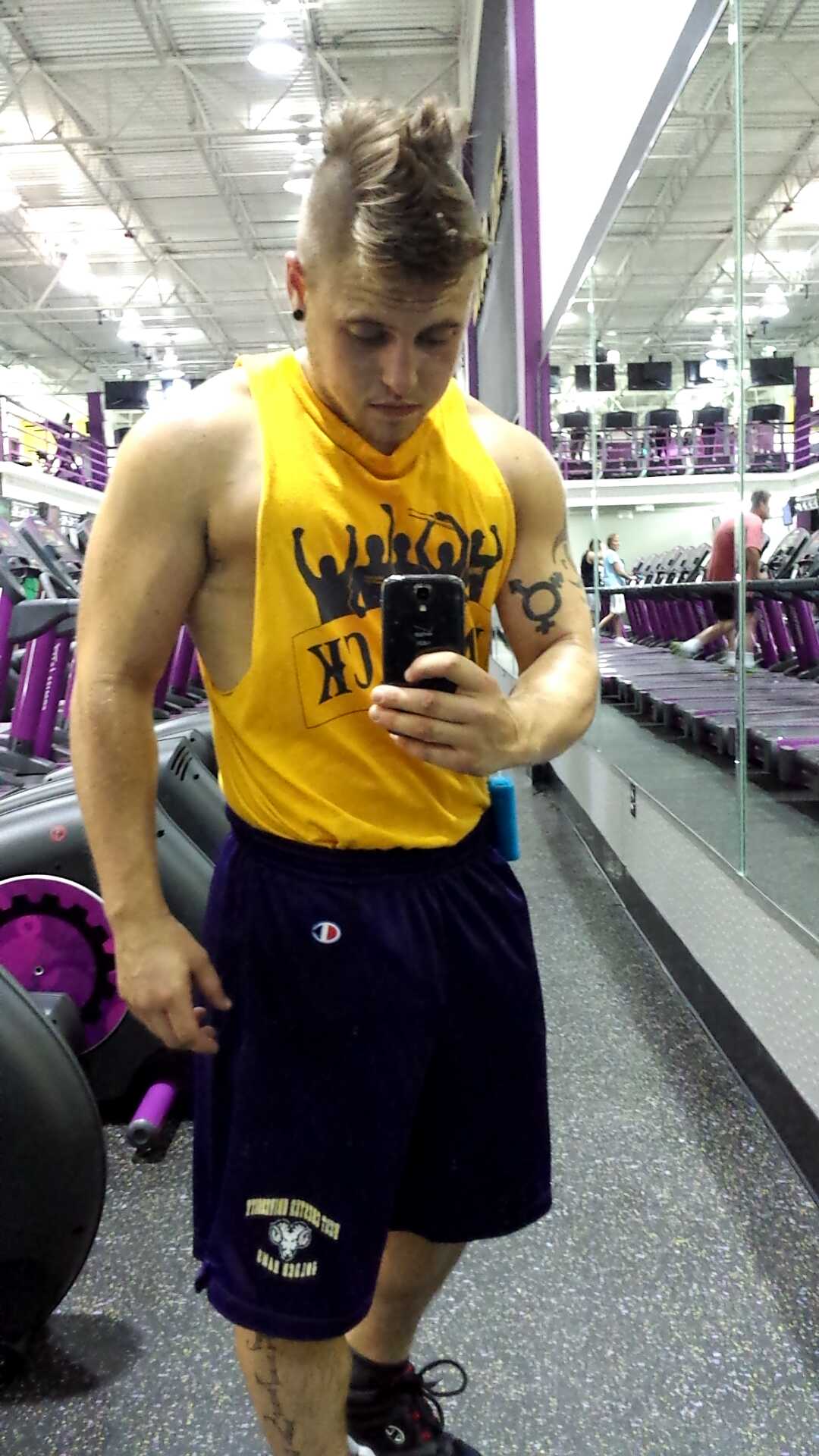 C: Can you talk more about your sports background?
C: Can you talk more about your sports background?
J: I ended his High school Field Hockey career as a 1st Team All American Field Hockey Goal Keeper. I played on a travel Field Hockey team called the Mystx that won both the indoor and outdoor national championships with him as their Goal Keeper. This led me to college at Drexel University, where I played Field Hockey on scholarship. My freshman year I started Goalkeeper and in that first year my team made it to the NCAA Elite 8 game ending our season with 19 wins (the highest number of wins in a single season). This record still holds true today! I also played travel softball for the Horsham Banshees from age 12-18 and was on the 2008 State Championship PIAA AAAA softball team at Hatboro Horsham High School. I didn’t play soccer for school because it was in the same season as softball but I did play travel soccer as a GK in middle school which I think helped me be a better FH Goalie. I also played varsity basketball my Freshman and Sophomore year of HS. Sports were definitely, my thing!
C: Can you talk a little bit more about how you view psychological pain versus physical pain?
J: For me physical pain served as distraction from my own thoughts. It was something I had control over whereas my thoughts I could not control. One pain would feed the other and vice versa, it was a vicious cycle. It almost became an addiction. Cutting for me was like a drug-- to distract myself and escape reality.
C: Can you delve a little deeper into your hospitalization?
J: My family was very supportive. Although I didn’t want any visitors, I know they wanted to see me because they were scared for me and love me very much. I believe my mom is the only one I allowed to visit and maybe my dad did too. I don’t quite remember. However, they were all always very supportive towards me throughout all my struggles. I self-injured multiple times a day, 50-100 cuts at a time, for the better part of 5 years. My 1st hospitalization came in January 2011 after my normal cutting behavior wasn’t enough to relieve the psychological pain I was feeling at the time. I wrote a note and I tied a tie around my neck attempting to choke myself in my college dorm room, but couldn’t do it. Immediately after this serious contemplation of suicide, I contacted my therapist who I had been seeing and working with since I arrived at college in 2009. It was my decision to ask for help and it was my decision to seek treatment. I knew I didn’t really want to end my life, but the mental state that I was in had me contemplating suicide on a regular basis. I think that alone scared me enough to try and get more help. I knew I couldn’t continue to live the way I was living. So, my therapist had a public safety officer drive her and I over to the nearest hospital Emergency Room. It didn’t take long for me to to be seen by a doctor. I was immediately treated for surface abrasions and given a 1 to 1-- meaning someone continually kept a close eye on me due to my suicidal ideations. I was eventually transferred to a psychiatric hospital associated with that ER via ambulance. I stayed there for a duration of five days. When I went into this, I wasn’t expecting to be cured, but I hoped to gain more tools in coping with depression, anxiety, and self-harm behaviors. This short time did allow me to clear my head and take a break from stressors of the real world, but after leaving I still felt unsafe from myself. It didn’t help that when I was discharged they called me a taxi that would take me to a location near campus. Immediately after being discharged, I had an appointment with my psychiatrist whom I had been seeing for medication treatment prior to being hospitalized. Anxiety ridden and vulnerable, leaving the hospital in this way was not beneficial for me. Later talking with my Mom, she reassured me that she and the rest of my family were on my side and whatever I needed they would try their best to accommodate. She even said I could go back to the hospital if I wasn’t ready. Not even a month later, I found myself back in the hospital. This time in a different hospital. This second stay lasted nine days and it was a much better experience. Still, I knew I couldn’t leave there cured, but having this time to really work intensely on my mental health helped change my outlook on life.
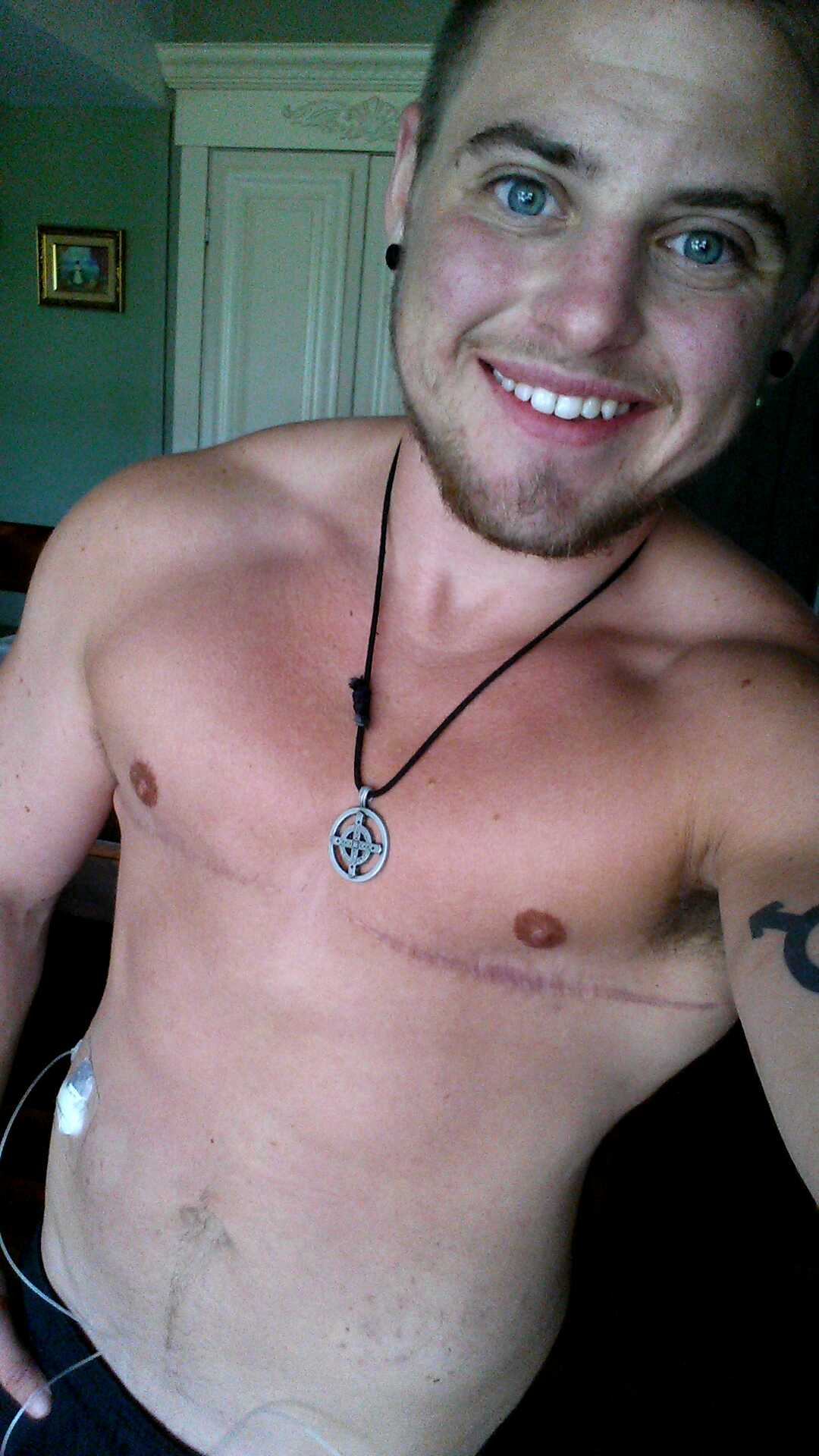 C: What activities do you usually do when you hit the gym?
C: What activities do you usually do when you hit the gym?
J: I usually start my gym sessions by running on the treadmill for at least a mile. I walk at 3.0 mph pace for a minute then go to either 6.5 or 7.0 mph at 2.0 incline for the remainder of that mile interval. Sometimes I’ll sprint for a quarter of a mile then get off do either some pushups or burpees then repeat the process. At this point I do some stretching before I hit the weight section. I usually focus on a specific body part or parts each day: shoulders, back and biceps, chest and triceps, legs, etc. I take how my body is feeling into consideration and plan to be flexible if any desired machine is occupied. I don’t always have a set plan, but this is a recent goal of mine-- to get into a more regimented routine. I’m also known by my friends to randomly do pushups or headstands at anytime or place.
C: Do you have any advice for someone trying to get in shape/transform their body?
J: Be consistent in going to the gym or engaging in physical activity. The gym is not necessary for achieving fitness. Stay motivated and make your workouts fun. Change things up to keep it fresh and to confuse your muscles. Doing the same things over and over will limit your growth and most likely cause you to plateau. Be disciplined in the kitchen, but don’t deprive yourself of foods you enjoy. Everything is OK in moderation.
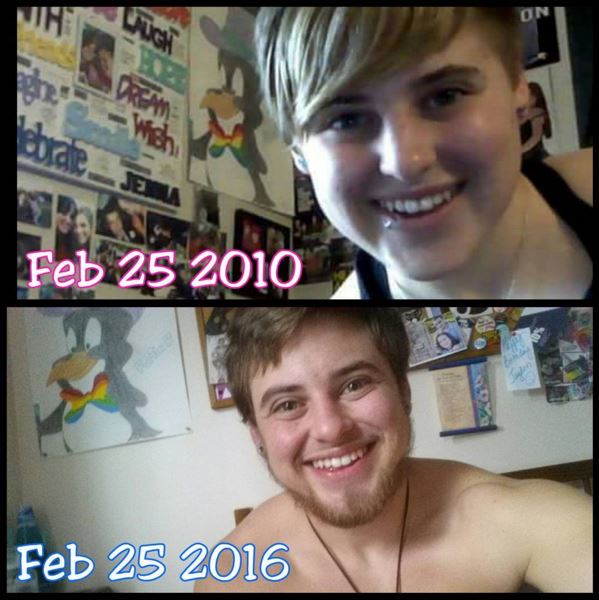 C: How specifically did the trans-man you met help you accept or love yourself more?
C: How specifically did the trans-man you met help you accept or love yourself more?
J: I can say that he opened my eyes to the possibilities of transitioning. He introduced me to the Trans Youtube community where people with this background share their stories and journeys throughout their transition. After learning about what transgender was, I found comfort in knowing I wasn’t the only one who had these feelings their entire lives. Watching these videos allowed me to better understand the process transitioning and its effects. I’d say for about 6 months I obsessively watched youtube videos of voice changes and body changes from guys who were already on hormones and for good reasons; I knew that this was something I had to do in order to finally feel at peace with my own self-image.
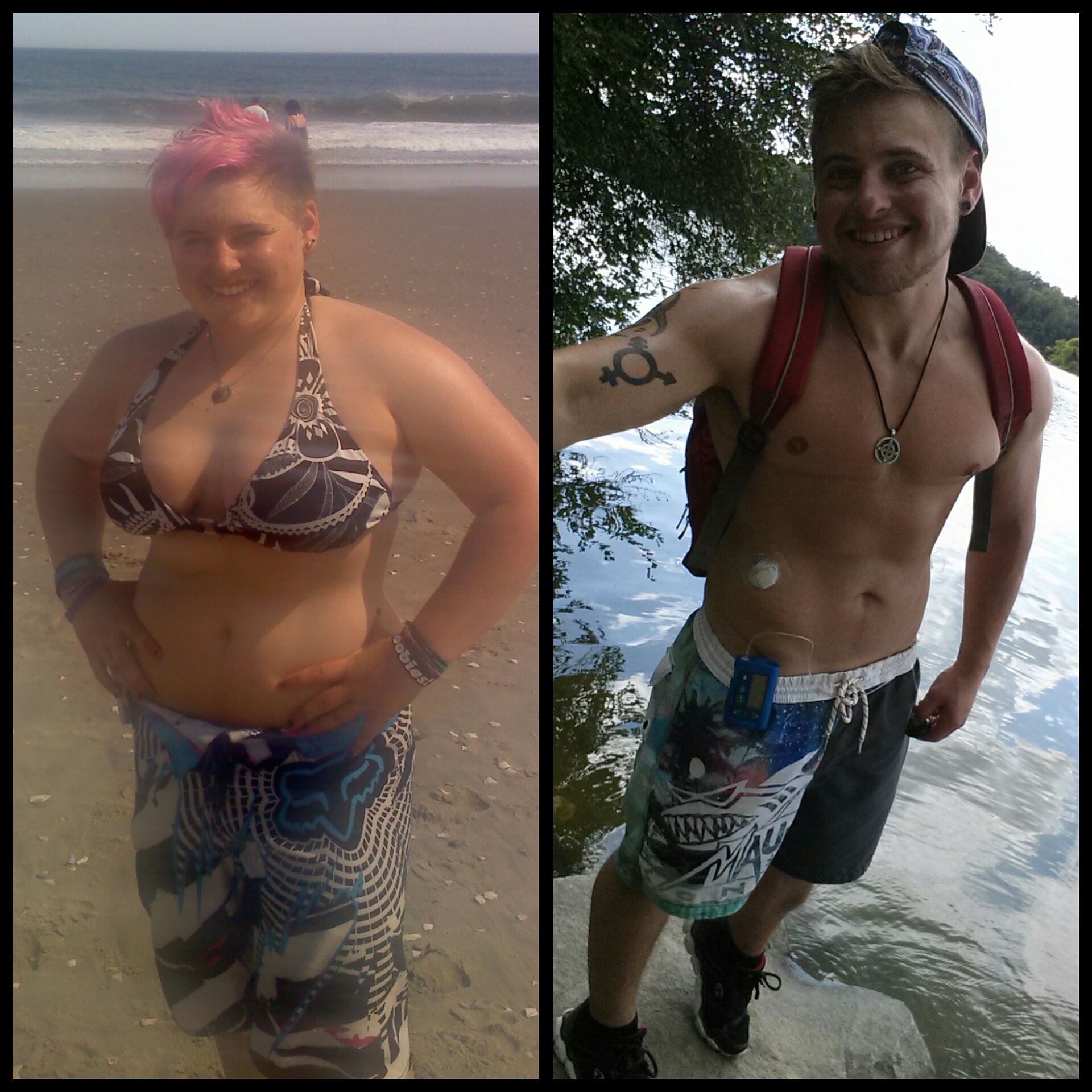
C: You mentioned earlier that you had a strong support network thus far. Can you talk a little bit more about how they supported and continue to support you?
J: My support network is just there for me. They let me know that they care and that my happiness is all they ever wanted for me. They showed that they love me no matter what the circumstances. It was hard for them to get used to calling me male pronouns and my new name, Jayden, but that didn’t bother me because I knew they were trying their best to support me. My support network would correct themselves when they slipped and correct others if they slipped. The act of trying was good enough because I knew in time it would become easier. For 21 years I was referred to as one pronoun, “she,” and name “Jenna”. I understood that it’s difficult to suddenly switch pronouns and name. It was even hard for me. It was not only a transition for me but for everyone in my life and that’s important to remember when being misgendered or called the wrong name. For me, it only becomes a problem if someone maliciously or purposefully ignores my wishes and misgenders me or calls me the wrong name.
C: Do you have any recommendations for our readers on how to build a support network this strong?
J: Surround yourself with people who will not necessarily understand you but accept you for who you are. It is not their understanding but their acceptance that is important.
C: Can you talk more about therapy and how that has helped you move forward a better person?
J: Although therapy can often be stigmatized, it shouldn’t be. Going to therapy doesn’t make you weak or incapable of figuring things out. Having someone to talk to who is unbiased to your situation can be refreshing and quite rewarding. It can help you to process, evaluate, and work through any situation you feel the need to talk about.

This feature was sponsored by APOP Studios' Creative Stress Management Workshops. Schedule your group stress management workshop today! Great for work and school events. Email info@apopstudios.com or find more information at www.apopstudios.com/movingmindfully.

First Friday Feature: Andrew Cerami
"First Friday Feature, Andrew Cerami, says ,"My biggest hope as an artist is to make things that inspire the viewer to contemplate and search inside themselves so that they too can begin to engage the creative power of Self and bring its healing and transforming power into everyday life." -Andrew Cerami
How balanced is your wellness wheel?
How balanced is your wellness wheel?
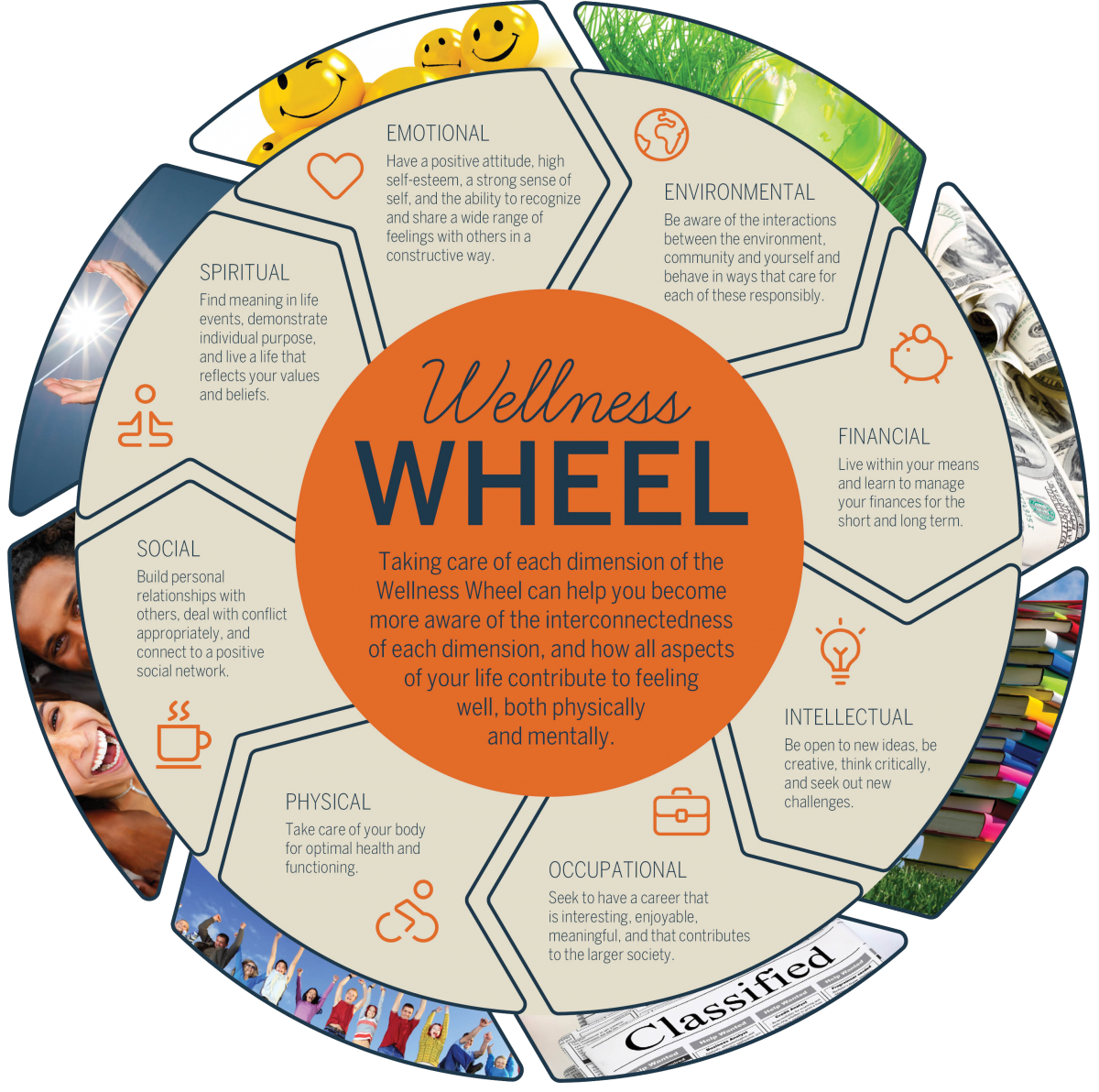
"Wellness Is...
- An active process through which you become aware of, and make choices towards, a more balanced life
- A conscious, self-directed and evolving process of achieving your full potential
- A multi-dimensional and whole-self lifestyle
- Positive and self-affirming "
Source: Wellness | Health Services
Happy Vlog-iversary!
https://www.youtube.com/watch?v=mg_2PwUMkIA
How Mindful Eating Can Help You Lose Weight + 5 Tips to Get Started
This article first appeared on MyFitnessPal on January 29, 2016:
"
Snacking while cooking dinner, eating while writing emails, munching on the drive to work. Multitasking might save time, but when it comes to eating there is also a cost: distraction.
Multitasking while eating makes it challenging to be mindful. Ever sat in front of the TV with a bag of chips or a bowl of ice cream and magically, the food vanishes before your eyes and you wonder what that last bite tasted like? Or maybe you find yourself at 10PM with calories remaining for the day so you go for the cookies, despite still feeling full from dinner. Whether eating is a result of physical or emotional distraction, both have the same end result: mindless eating.
Mindful eating is being aware of the taste, texture, aroma, presentation, and your body’s hunger and fullness cues. Getting to know your hunger and fullness is the secret to losing the weight for good and keeping it off.
1. Eat with balance. Eating a variety of foods at each meal not only provides balanced nutrition, it can also help with meal satisfaction. Make sure that your plate has 3 foods: Fiber, Fat, and Protein. These three ingredients take the longest to break down causing a slower release of energy and keeping you fuller for longer. Find fibers through fruit, vegetables, whole grains, nuts, and seeds. Opt for healthy fats like avocado, nuts, nut butters, seeds, and olive oils. Get protein from a variety of sources including meat, fish, poultry, tofu, tempeh, beans, and nuts.
2. Time your meals. If you’ve been dieting or eating sporadically for some time, it’s time to recalibrate your hunger and fullness meter. Many people say that when they begin mindful eating that they don’t really feel hungry or full; that’s likely because your hunger and fullness meter is off. Begin to get back on track by eating food in regular intervals, about every 4 hours or so–paying close attention to portion size. This is enough time for your body to recognize the swings in energy levels without getting overly hungry. Keep in mind if you still are not hungry after 4-5 hours of eating, you might have eaten a bit too much at that last meal. Not to worry though! Simply wait until your body tells you it needs more fuel in the tank before eating again. Check out this article to dive deeper into understanding and listening to your hunger cues.
3. Be Present. It can’t be overstated that to become a mindful eater, the mind and body must be present with the plate. Eat with intention, turn off the TV and shut down the computer while dining at the table. Distracted eating is a major contributor to unintentional overeating. Focusing on your meal or snack will not only lead to greater enjoyment of whatever you’re eating but a greater awareness of your hunger and satiety cues.
4. Know your numbers. Becoming aware of the body’s internal cues to hunger and fullness will keep blood sugar stable and increase energy levels. Mindful eating requires trusting the body to know “how much” food is needed and when to stop. When you sit down to a meal ask yourself, “How hungry am I”, and give it a number from 1 to 10 with 1 being starving and 10 being stuffed. We tend to eat with our eyes over our stomachs; mindful eating is a turn from that norm. Even though mindful eating is a skill we were born with and have lost along the way, it will take some time to relearn. Instead of eating on autopilot and cleaning your plate out of habit, challenge yourself to put the fork down when you are actually satisfied (6-7) vs. stuffed (8-9). Remember to not let your body get overly hungry and eat when you feel a gentle hunger (3).
5. Accept the here and now. So you want to make changes to your body composition and/or lose some weight, first start with loving your body just the way it is. If you find that you cannot accept yourself as you are, this is the first place to start on your mindful eating journey. The confidence that you find from within will keep you grounded and able to trust your body enough to be a mindful eater.
Mindful eating takes guts and can be scary, but on the other side there is freedom from the diet trap. Consider weight loss and improved body composition as a side effect of eating mindfully, instead of the end goal. For some this step can be achieved by finding an activity that you truly enjoy, cleaning out the closet and buying clothes that fit and look fabulous on you, or tossing the scale if it’s defining your self worth every time you step on it.
Lastly, remember to be patient with yourself as you begin eating mindfully. You might not feel good at it at first, but like with anything practice is key. Keep focused on your true goals and weight loss will be a side effect of your new healthful relationship with food."
Click here to read the article on their blog.
"Art has helped me become a happier, healthier person": Philadelphia Artist Kimberly Jackson
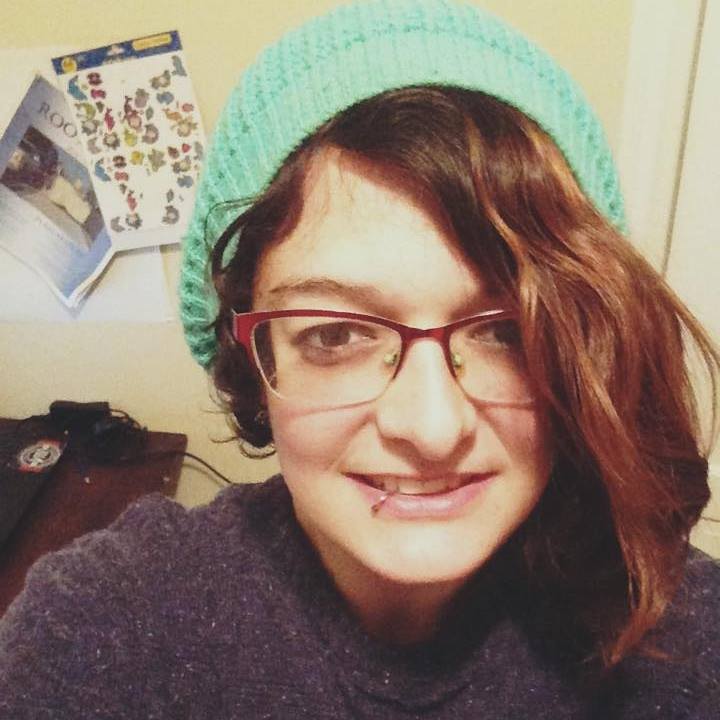 In honor of First Friday, an exciting day once a month during which Philadelphia art galleries usually hold their opening receptions, we are pleased to highlight an artist who is changing the way we look at mental health. Kim Jackson's latest piece, Dissociation, hits the nail right on the head for so many people struggling with depression and anxiety. Her work not only gives its viewers a deeper understanding about the struggles of having a mental illness, but also demonstrates that these same negative emotions and thoughts CAN be used for positive social change by raising awareness.
In honor of First Friday, an exciting day once a month during which Philadelphia art galleries usually hold their opening receptions, we are pleased to highlight an artist who is changing the way we look at mental health. Kim Jackson's latest piece, Dissociation, hits the nail right on the head for so many people struggling with depression and anxiety. Her work not only gives its viewers a deeper understanding about the struggles of having a mental illness, but also demonstrates that these same negative emotions and thoughts CAN be used for positive social change by raising awareness.
Kim on Dissociation:
https://youtu.be/r_phc2suXcI
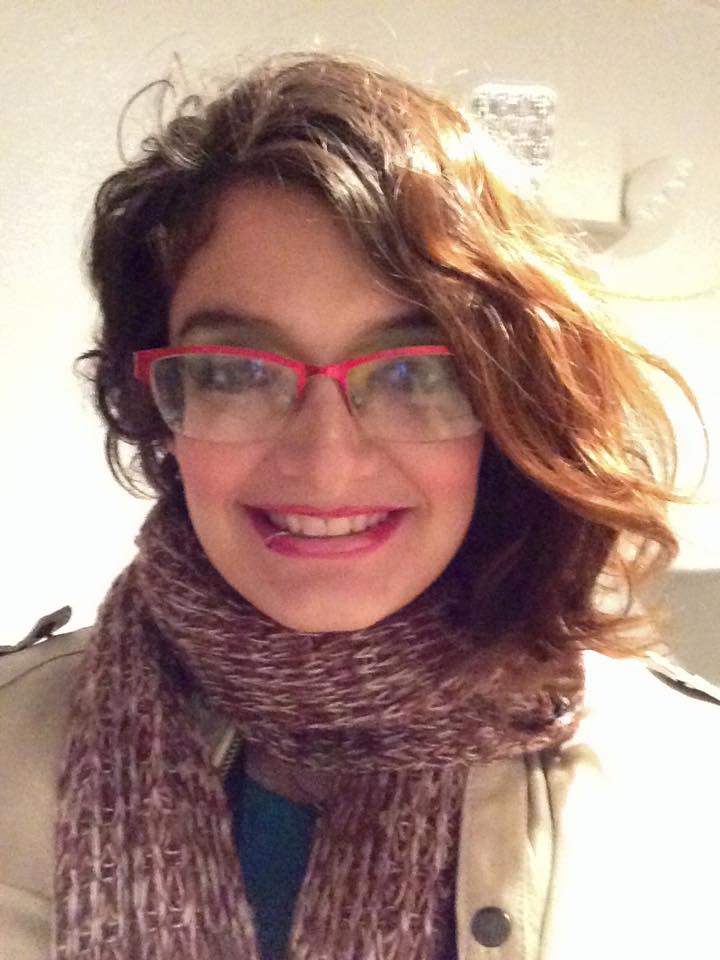 As I prepared the piece and put everything together, I realized I have never vocalized some of these feelings before. I had never spoken those words out loud, and I had never allowed anyone to see those intimate moments. It was the most difficult project I have ever worked on, but in the end, it was the absolute most rewarding. By allowing myself to truly be the most vulnerable I have ever been in public, I allowed myself to experience the kindness of others. Each and every person who saw my piece expressed to me how they personally connected to the piece, and how they relate to anxiety and depression. So many people shared their struggles and it helped me heal in a way no one can ever imagine. It helped me realize that hiding your struggles only holds you back and prevents you from moving on. Now, I am honest and truthful to my friends about my state of mind, and I ask for help if I recognize I need it. Putting myself fully into my art, has helped me become a happier, healthier person, and I hope my art has helped others the same way.
As I prepared the piece and put everything together, I realized I have never vocalized some of these feelings before. I had never spoken those words out loud, and I had never allowed anyone to see those intimate moments. It was the most difficult project I have ever worked on, but in the end, it was the absolute most rewarding. By allowing myself to truly be the most vulnerable I have ever been in public, I allowed myself to experience the kindness of others. Each and every person who saw my piece expressed to me how they personally connected to the piece, and how they relate to anxiety and depression. So many people shared their struggles and it helped me heal in a way no one can ever imagine. It helped me realize that hiding your struggles only holds you back and prevents you from moving on. Now, I am honest and truthful to my friends about my state of mind, and I ask for help if I recognize I need it. Putting myself fully into my art, has helped me become a happier, healthier person, and I hope my art has helped others the same way.